Itinerary
The infinite variety of street life, the nooks and crannies of the medieval Barri Gòtic, the ceramic tile and stained glass of Art Nouveau facades, the art and music, the throb of street life, the food (ah, the food!)—one way or another, Barcelona will find a way to get your full attention. The capital of Catalonia is a banquet for the senses, with its beguiling mix of ancient and modern architecture, tempting cafés and markets, and sun-drenched Mediterranean beaches. A stroll along La Rambla and through waterfront Barceloneta, as well as a tour of Gaudí’s majestic Sagrada Famíliaand his other unique creations, are part of a visit to Spain’s second-largest city. Modern art museums and chic shops call for attention, too. Barcelona’s vibe stays lively well into the night, when you can linger over regional wine and cuisine at buzzing tapas bars.
The capital of Menorca since 1721, Mahon has a impressive natural deep water harbour, which is one of the largest in the world. This, coupled with its strategic location, has made it a stronghold for many nations throughout history. Mahon has an abundance of historical buildings, the oldest being the Arch of Saint Roc which is all that remains of the wall that once encircled the whole town. The island was occupied by the British during the 18th century and Lord Nelson is thought to have stayed there. Indeed, San Antoni Mansion, located on the north side of the harbour, houses a collection of Nelson memorabilia. The legacy of colonial rule can be seen in the muted Georgian style of some of the buildings, but Mahon still boasts attractive examples of neo-Classical, Baroque and Romanesque architecture. With narrow streets to explore, pleasant shaded squares and welcoming pavement cafés, there is something for everyone to enjoy. Please be aware that most shops in town close for a siesta between 1330 and 1730.
If you look north of the cathedral (La Seu, or the seat of the bishopric, to Mallorcans) on a map of the city of Palma, you can see around the Plaça Santa Eulàlia a jumble of tiny streets that made up the earliest settlement. Farther out, a ring of wide boulevards traces the fortifications built by the Moors to defend the larger city that emerged by the 12th century. The zigzags mark the bastions that jutted out at regular intervals. By the end of the 19th century, most of the walls had been demolished; the only place where you can still see the massive defenses is at Ses Voltes, along the seafront west of the cathedral.A torrent (streambed) used to run through the middle of the old city, dry for most of the year but often a raging flood in the rainy season. In the 17th century it was diverted to the east, along the moat that ran outside the city walls. Two of Palma’s main arteries, La Rambla and the Passeig d’es Born, now follow the stream’s natural course. The traditional evening paseo (promenade) takes place on the Born.If you come to Palma by car, park in the garage beneath the Parc de la Mar (the ramp is just off the highway from the airport, as you reach the cathedral) and stroll along the park. Beside it run the huge bastions guarding the Almudaina Palace; the cathedral, golden and massive, rises beyond. Where you exit the garage, there’s a ceramic mural by the late Catalan artist and Mallorca resident Joan Miró, facing the cathedral across the pool that runs the length of the park.If you begin early enough, a walk along the ramparts at Ses Voltes from the mirador beside the cathedral is spectacular. The first rays of the sun turn the upper pinnacles of La Seu bright gold and then begin to work their way down the sandstone walls. From the Parc de la Mar, follow Avinguda Antoni Maura past the steps to the palace. Just below the Plaça de la Reina, where the Passeig d’es Born begins, turn left on Carrer de la Boteria into the Plaça de la Llotja (if the Llotja itself is open, don’t miss a chance to visit—it’s the Mediterranean’s finest Gothic-style civic building). From there stroll through the Plaça Drassana to the Museu d’Es Baluard, at the end of Carrer Sant Pere. Retrace your steps to Avinguda Antoni Maura. Walk up the Passeig d’es Born to Plaça Joan Carles I, then right on Avenida de La Unió.
The fishing village of Sète serves as gateway to Montpellier, in the North. Other noteworthy destinations in this area include Carcassone, Aigues Mortes, the Abbaye de Fontfroide, and Pezenas. For a look at the real fisherman’s life, however, stay right where you are. Sète is the Mediterranean’s biggest fishing port. Canals winding through town make it fun to stroll around, and there are a number of good walking paths leading to the beach (about 30 minutes to the west). Although it’s small and unspectacular, Plage de la Corniche has calm, pristine waters that are perfect for swimming. For a panoramic view of the area, climb Mont St-Clair or Les Pierres Blanches and pick a beach to settle down on.
On one of the best stretches of the Mediterranean, this classic luxury destination is one of the most sought-after addresses in the world. With all the high-rise towers you have to look hard to find the Belle Époque grace of yesteryear. But if you head to the town’s great 1864 landmark Hôtel de Paris—still a veritable crossroads of the buffed and befurred Euro-gentry—or enjoy a grand bouffe at its famous Louis XV restaurant, or attend the opera, or visit the ballrooms of the casino, you may still be able to conjure up Monaco’s elegant past. Prince Albert II, a political science graduate from Amherst College, traces his ancestry to Otto Canella, who was born in 1070. The Grimaldi dynasty began with Otto’s great-great-great-grandson, Francesco Grimaldi, also known as Frank the Rogue. Expelled from Genoa, Frank and his cronies disguised themselves as monks and in 1297 seized the fortified medieval town known today as Le Rocher (the Rock). Except for a short break under Napoléon, the Grimaldis have been here ever since, which makes them the oldest reigning family in Europe. In the 1850s a Grimaldi named Charles III made a decision that turned the Rock into a giant blue chip. Needing revenue but not wanting to impose additional taxes on his subjects, he contracted with a company to open a gambling facility. The first spin of the roulette wheel was on December 14, 1856. There was no easy way to reach Monaco then—no carriage roads or railroads—so no one came. Between March 15 and March 20, 1857, one person entered the casino—and won two francs. In 1868, however, the railroad reached Monaco, and it was filled with Englishmen who came to escape the London fog. The effects were immediate. Profits were so great that Charles eventually abolished all direct taxes. Almost overnight, a threadbare principality became an elegant watering hole for European society. Dukes (and their mistresses) and duchesses (and their gigolos) danced and dined their way through a world of spinning roulette wheels and bubbling champagne—preening themselves for nights at the opera, where such artists as Vaslav Nijinsky, Sarah Bernhardt, and Enrico Caruso came to perform. Along with the tax system, its sensational position on a broad, steep peninsula that bulges into the Mediterranean—its harbor sparkling with luxury cruisers, its posh mansions angling awnings toward the nearly perpetual sun—continues to draw the rich and famous. One of the latest French celebrities to declare himself “Monégasque,” thus giving up his French passport, is superchef Alain Ducasse, who said that he made the choice out of affection for Monaco rather than tax reasons. Pleasure boats vie with luxury cruisers in their brash beauty and Titanic scale, and teams of handsome young men—themselves dyed blond and tanned to match—scour and polish every gleaming surface. As you might expect, all this glitz doesn’t come cheap. Eating is expensive, and even the most modest hotels cost more here than in nearby Nice or Menton. As for taxis, they don’t even have meters so you are completely at the driver’s mercy (with prices skyrocketing during events such as the Grand Prix). For the frugal, Monaco is the ultimate day-trip, although parking is as coveted as a room with a view. At the very least you can afford a coffee at Starbucks. The harbor district, known as La Condamine, connects the new quarter, officially known as Monte Carlo with Monaco-Ville (or Le Rocher), a medieval town on the Rock, topped by the palace, the cathedral, and the Oceanography Museum. Have no fear that you’ll need to climb countless steps to get to Monaco-Ville, as there are plenty of elevators and escalators climbing the steep cliffs. But shuttling between the lovely casino grounds of Monte Carlo and Old Monaco, separated by a vast port, is a daunting proposition for ordinary mortals without wings, so hop on the No. 1 bus from Saint Roman, or No. 2 from the Jardin Exotique – Both stop at Place du Casino and come up to Monaco Ville.
One of the most photographed villages along the coast, with a decidedly romantic and affluent aura, Portofino has long been a popular destination for the rich and famous. Once an ancient Roman colony and taken by the Republic of Genoa in 1229, it’s also been ruled by the French, English, Spanish, and Austrians, as well as by marauding bands of 16th-century pirates. Elite British tourists first flocked to the lush harbor in the mid-1800s. Some of Europe’s wealthiest drop anchor in Portofino in summer, but they stay out of sight by day, appearing in the evening after buses and boats have carried off the day-trippers.There’s not actually much to do in Portofino other than stroll around the wee harbor, see the castle, walk to Punta del Capo, browse at the pricey boutiques, and sip a coffee while people-watching. However, weaving through picture-perfect cliffside gardens and gazing at yachts framed by the sapphire Ligurian Sea and the cliffs of Santa Margherita can make for quite a relaxing afternoon. There are also several tame, photo-friendly hikes into the hills to nearby villages.Unless you’re traveling on a deluxe budget, you may want to stay in Camogli or Santa Margherita Ligure rather than at one of Portofino’s few very expensive hotels. Restaurants and cafés are good but also pricey (don’t expect to have a beer here for much under €10).
Calvi, Corsica’s slice of the Riviera, has been described by author Dorothy Carrington as “an oasis of pleasure on an otherwise austere island.” Calvi prospered by supplying products to Genoa; its citizens remained loyal supporters of Genoa long after the rest of the island declared independence. Calvi also claims to be the birthplace of Christopher Columbus. During the 18th century the town endured assaults from Corsican nationalists, including celebrated patriot Pasquale Paoli. Today Calvi sees a summertime invasion of tourists, drawn to the 6-km (4-mile) stretch of sandy white beach, impressive citadel overlooking the Old Town, lively restaurants, and buzzing nightlife.
Amid the resorts of Sardinia’s northeastern coast, Olbia, a town of about 60,000, is a lively little seaport and port of call for mainland ferries at the head of a long, wide bay.San SimplicioOlbia’s little Catholic basilica, a short walk behind the main Corso Umberto and past the train station, is worth searching out if you have any spare time in Olbia. The simple granite structure dates from the 11th century, part of the great Pisan church-building program, using pillars and columns recycled from Roman buildings. The basilica has a bare, somewhat somber interior, its three naves separated by a series of arches.
Italy’s vibrant capital lives in the present, but no other city on earth evokes its past so powerfully. For over 2,500 years, emperors, popes, artists, and common citizens have left their mark here. Archaeological remains from ancient Rome, art-stuffed churches, and the treasures of Vatican City vie for your attention, but Rome is also a wonderful place to practice the Italian-perfected il dolce far niente, the sweet art of idleness. Your most memorable experiences may include sitting at a caffè in the Campo de’ Fiori or strolling in a beguiling piazza.
At first glance, it’s hard to imagine that this resort destination was one of the world’s great naval powers, and a sturdy rival of Genoa and Pisa for control of the Mediterranean in the 11th and 12th centuries. Once the seat of the Amalfi Maritime Republic, the town is set in a verdant valley of the Lattari Mountains, with cream-colored and pastel-hued buildings tightly packing a gorge on the Bay of Salerno. The harbor, which once launched the greatest fleet in Italy, now bobs with ferries and blue-and-white fishing boats. The main street, lined with shops and pasticcerie, has replaced a raging mountain torrent, and terraced hills flaunt the green and gold of lemon groves. Bearing testimony to its great trade with Tunis, Tripoli, and Algiers, Amalfi remains honeycombed with Arab-Sicilian cloisters and covered passages. In a way Amalfi has become great again, showing off its medieval glory days with sea pageants, convents-turned-hotels, ancient paper mills, covered streets, and its glimmering cathedral.
The largest and most developed of the Aeolians, Lipari welcomes you with distinctive pastel-color houses. Fields of spiky agaves dot the northernmost tip of the island, Acquacalda, indented with pumice and obsidian quarries. In the west is San Calogero, where you can explore hot springs and mud baths. From the red-lava base of the island rises a plateau crowned with a 16th-century castle and a 17th-century cathedral.
Malta’s capital, the minicity of Valletta, has ornate palaces and museums protected by massive fortifications of honey-color limestone. Houses along the narrow streets have overhanging wooden balconies for people-watching from indoors. Generations ago they gave housebound women a window on the world of the street. The main entrance to town is through the City Gate (where all bus routes end), which leads onto Triq Repubblika (Republic Street), the spine of the grid-pattern city and the main shopping street. Triq Mercante (Merchant Street) parallels Repubblika to the east and is also good for strolling. From these two streets, cross streets descend toward the water; some are stepped. Valletta’s compactness makes it ideal to explore on foot. City Gate and the upper part of Valletta are experiencing vast redevelopment that includes a new Parliament Building and open-air performance venue. The complex, completed mid-2013, has numerous pedestrian detours in place along with building noise and dust. Before setting out along Republic Street, stop at the tourist information office on Merchant Street for maps and brochures.
Malta’s capital, the minicity of Valletta, has ornate palaces and museums protected by massive fortifications of honey-color limestone. Houses along the narrow streets have overhanging wooden balconies for people-watching from indoors. Generations ago they gave housebound women a window on the world of the street. The main entrance to town is through the City Gate (where all bus routes end), which leads onto Triq Repubblika (Republic Street), the spine of the grid-pattern city and the main shopping street. Triq Mercante (Merchant Street) parallels Repubblika to the east and is also good for strolling. From these two streets, cross streets descend toward the water; some are stepped. Valletta’s compactness makes it ideal to explore on foot. City Gate and the upper part of Valletta are experiencing vast redevelopment that includes a new Parliament Building and open-air performance venue. The complex, completed mid-2013, has numerous pedestrian detours in place along with building noise and dust. Before setting out along Republic Street, stop at the tourist information office on Merchant Street for maps and brochures.
Trapani, the most important town on Sicily’s west coast, lies below the headland of Mount Erice and offers stunning views of the Egadi Islands on a clear day. Trapani’s Old District occupies a scimitarshaped promontory between the open sea on the north and the salt marshes to the south. The ancient industry of extracting salt from the marshes has recently been revived, and it is documented in the Museo delle Saline. In addition to the salt marshes,Trapani’s other interesting environs include the beautiful little hill town of Erice, the promontory of Capo San Vito stretching north beyond the splendid headland of Monte Cofano, the lovely island of Motya and the town of Marsala. Trips farther afield will take you to the magnificent site of Segesta or the Egadi Islands, reached by boat or hydrofoil from Trapani Port.
The infinite variety of street life, the nooks and crannies of the medieval Barri Gòtic, the ceramic tile and stained glass of Art Nouveau facades, the art and music, the throb of street life, the food (ah, the food!)—one way or another, Barcelona will find a way to get your full attention. The capital of Catalonia is a banquet for the senses, with its beguiling mix of ancient and modern architecture, tempting cafés and markets, and sun-drenched Mediterranean beaches. A stroll along La Rambla and through waterfront Barceloneta, as well as a tour of Gaudí’s majestic Sagrada Famíliaand his other unique creations, are part of a visit to Spain’s second-largest city. Modern art museums and chic shops call for attention, too. Barcelona’s vibe stays lively well into the night, when you can linger over regional wine and cuisine at buzzing tapas bars.
As you sail into Malaga you will notice what an idyllic setting the city enjoys on the famous Costa del Sol. To the east of this provincial capital, the coast along the region of La Axarqua is scattered with villages, farmland and sleepy fishing hamlets – the epitome of traditional rural Spain. To the west stretches a continuous city where the razzmatazz and bustle creates a colourful contrast that is easily recognisable as the Costa del Sol. Surrounding the region, the Penibéetica Mountains provide an attractive backdrop overlooking the lower terraced slopes which yield olives and almonds. This spectacular mountain chain shelters the province from cold northerly winds, giving it a reputation as a therapeutic and exotic place in which to escape from cold northern climes. Malaga is also the gateway to many of Andalusia’s enchanting historic villages, towns and cities.
Tagged on to the end of Iberia, the intriguing British outpost of Gibraltar is dominated by a sandy peninsula and the stunning 1,400-feet-high limestone Rock. Although small, Gibraltar has always been seen as having great strategic importance on account of its advantageous position where the Atlantic meets the Mediterranean, just 12 miles from the coast of Africa. Ever popular with British holidaymakers, Gibraltar is very much a home from home, boasting excellent duty-free shopping in many familiar British high street shops. Please note: Gibraltar’s small size and narrow winding roads mean that excursions are operated by 22-seater mini-buses, accompanied by a driver/guide. Local health and safety regulations prohibit the carriage of walking aids and collapsible wheelchairs on these vehicles. If you do wish to bring a mobility aid, we can arrange the Rock Tour by taxi, which has extra space. If this suits your requirements, please advise the Tours and Travel office when you join the ship, as numbers are limited.
The original settlement formed on the site of Casablanca by the Berbers became the kingdom of Anfa, and during the 15th century harboured pirates who raided the Portuguese coast. In retaliation for the attacks, the Portuguese destroyed Anfa and founded the town they called Casa Branca (white house). They remained here until an earthquake in 1755 and the town was subsequently rebuilt by Mohammed ben Abdallah, whose legacy of mosques and houses can still be seen in the old Medina. Casablanca acquired its present-day name when the Spanish obtained special port privileges in 1781. The French landed here in 1907, later establishing a protectorate and modelling the town on the port of Marseilles. Today Casablanca is Morocco’s largest city, its most significant port and the centre of commerce and industry. The city is a vibrant fusion of European, African and Arabian influences and its French colonial architecture and art deco buildings seamlessly blend in with the busy, colourful markets. Please note that vendors in the souks can be very persistent and eager to make a sale.
The original settlement formed on the site of Casablanca by the Berbers became the kingdom of Anfa, and during the 15th century harboured pirates who raided the Portuguese coast. In retaliation for the attacks, the Portuguese destroyed Anfa and founded the town they called Casa Branca (white house). They remained here until an earthquake in 1755 and the town was subsequently rebuilt by Mohammed ben Abdallah, whose legacy of mosques and houses can still be seen in the old Medina. Casablanca acquired its present-day name when the Spanish obtained special port privileges in 1781. The French landed here in 1907, later establishing a protectorate and modelling the town on the port of Marseilles. Today Casablanca is Morocco’s largest city, its most significant port and the centre of commerce and industry. The city is a vibrant fusion of European, African and Arabian influences and its French colonial architecture and art deco buildings seamlessly blend in with the busy, colourful markets. Please note that vendors in the souks can be very persistent and eager to make a sale.
A Mediterranean city and naval station located in the Region of Murcia, southeastern Spain, Cartagena’s sheltered bay has attracted sailors for centuries. The Carthaginians founded the city in 223BC and named it Cartago Nova; it later became a prosperous Roman colony, and a Byzantine trading centre. The city has been the main Spanish Mediterranean naval base since the reign of King Philip II, and is still surrounded by walls built during this period. Cartagena’s importance grew with the arrival of the Spanish Bourbons in the 18th century, when the Navidad Fortress was constructed to protect the harbour. In recent years, traces of the city’s fascinating past have been brought to light: a well-preserved Roman Theatre was discovered in 1988, and this has now been restored and opened to the public. During your free time, you may like to take a mini-cruise around Cartagena’s historic harbour: these operate several times a day, take approximately 40 minutes and do not need to be booked in advance. Full details will be available at the port.
Valencia, Spain’s third-largest municipality, is a proud city with a thriving nightlife and restaurant scene, quality museums, and spectacular contemporary architecture, juxtaposed with a thoroughly charming historic quarter, making it a popular destination year in year out. During the Civil War, it was the last seat of the Republican Loyalist government (1935–36), holding out against Franco’s National forces until the country fell to 40 years of dictatorship. Today it represents the essence of contemporary Spain—daring design and architecture along with experimental cuisine—but remains deeply conservative and proud of its traditions. Though it faces the Mediterranean, Valencia’s history and geography have been defined most significantly by the River Turia and the fertile huerta that surrounds it.The city has been fiercely contested ever since it was founded by the Greeks. El Cid captured Valencia from the Moors in 1094 and won his strangest victory here in 1099: he died in the battle, but his corpse was strapped into his saddle and so frightened the besieging Moors that it caused their complete defeat. In 1102 his widow, Jimena, was forced to return the city to Moorish rule; Jaume I finally drove them out in 1238. Modern Valencia was best known for its frequent disastrous floods until the River Turia was diverted to the south in the late 1950s. Since then the city has been on a steady course of urban beautification. The lovely bridges that once spanned the Turia look equally graceful spanning a wandering municipal park, and the spectacularly futuristic Ciutat de les Arts i les Ciències (City of Arts and Sciences), most of it designed by Valencia-born architect Santiago Calatrava, has at last created an exciting architectural link between this river town and the Mediterranean. If you’re in Valencia, an excursion to Albufera Nature Park is a worthwhile day trip.
The infinite variety of street life, the nooks and crannies of the medieval Barri Gòtic, the ceramic tile and stained glass of Art Nouveau facades, the art and music, the throb of street life, the food (ah, the food!)—one way or another, Barcelona will find a way to get your full attention. The capital of Catalonia is a banquet for the senses, with its beguiling mix of ancient and modern architecture, tempting cafés and markets, and sun-drenched Mediterranean beaches. A stroll along La Rambla and through waterfront Barceloneta, as well as a tour of Gaudí’s majestic Sagrada Famíliaand his other unique creations, are part of a visit to Spain’s second-largest city. Modern art museums and chic shops call for attention, too. Barcelona’s vibe stays lively well into the night, when you can linger over regional wine and cuisine at buzzing tapas bars.
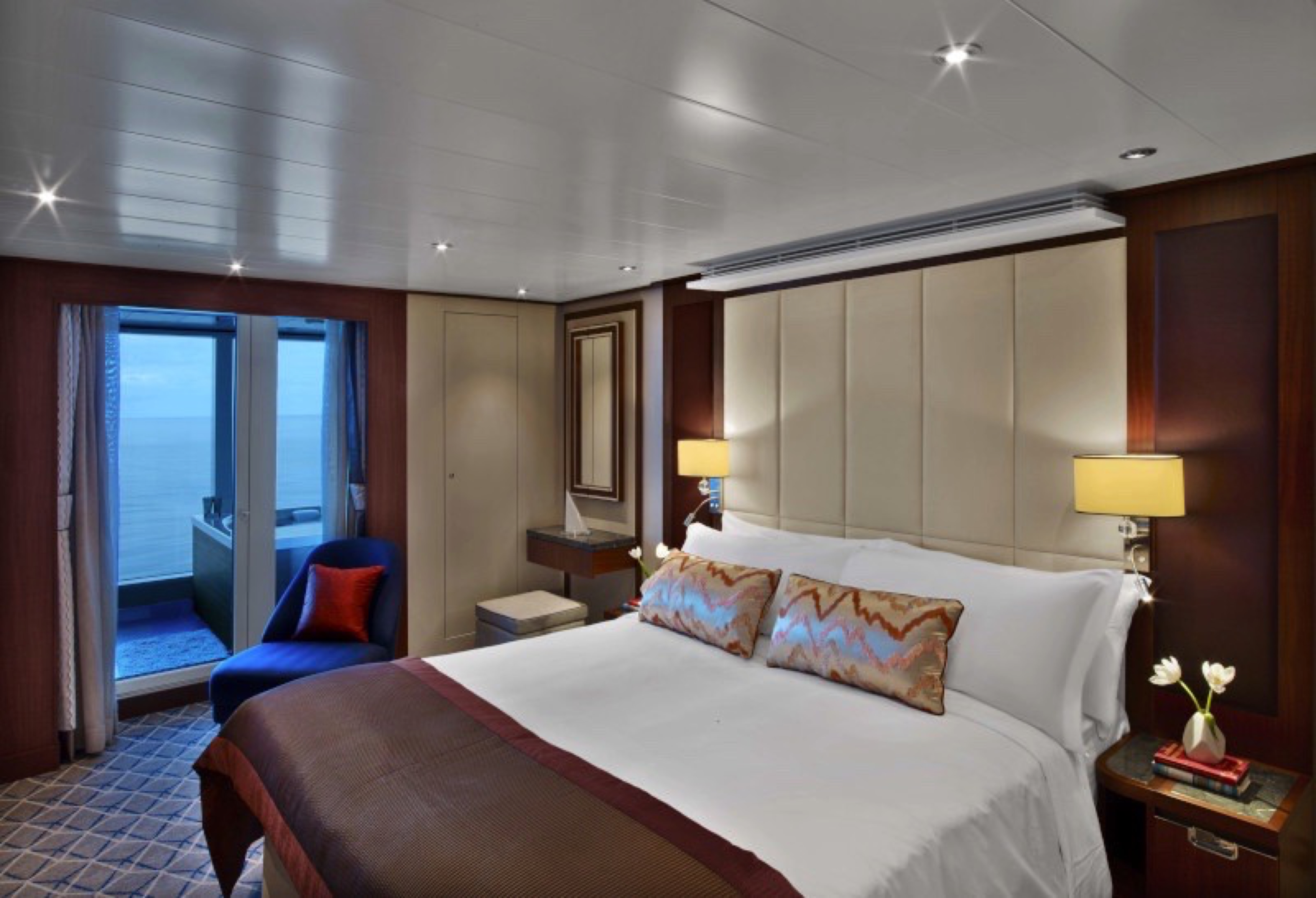
Located on Deck 8; Combine mid-ship suites 849 and 851 for suite 8491 or suites 846 and 848 for suite 8468 for a total inside space of 1,292 square feet (120 square meters) plus two verandas totaling 244 square feet (23 square meters)
Grand Wintergarden Suites feature:
- Large windows
- Dining for six
- Glass-enclosed solarium with tub and day bed
- Bathroom with whirlpool bathtub
- Two bedrooms
- Two bathrooms (one whirlpool)
- Convertible sofa bed for one
- Pantry with wet bar
- Two flat-screen TVs
- Complimentary Internet/Wi-Fi service

Located on Deck 8; mid-ship suites 846 and 849 inside space of 989 square feet (92 square meters) plus one veranda of 197 square feet (18 square meters)
Wintergarden Suites feature:
- Large windows
- Dining for six
- Whirlpool bathtub
- Guest bath
- Convertible sofa bed for one
- Pantry with wet bar
- Glass-enclosed solarium with tub and day bed
- Two closets
- Two flat-screen TVs
- Complimentary Internet/Wi-Fi service
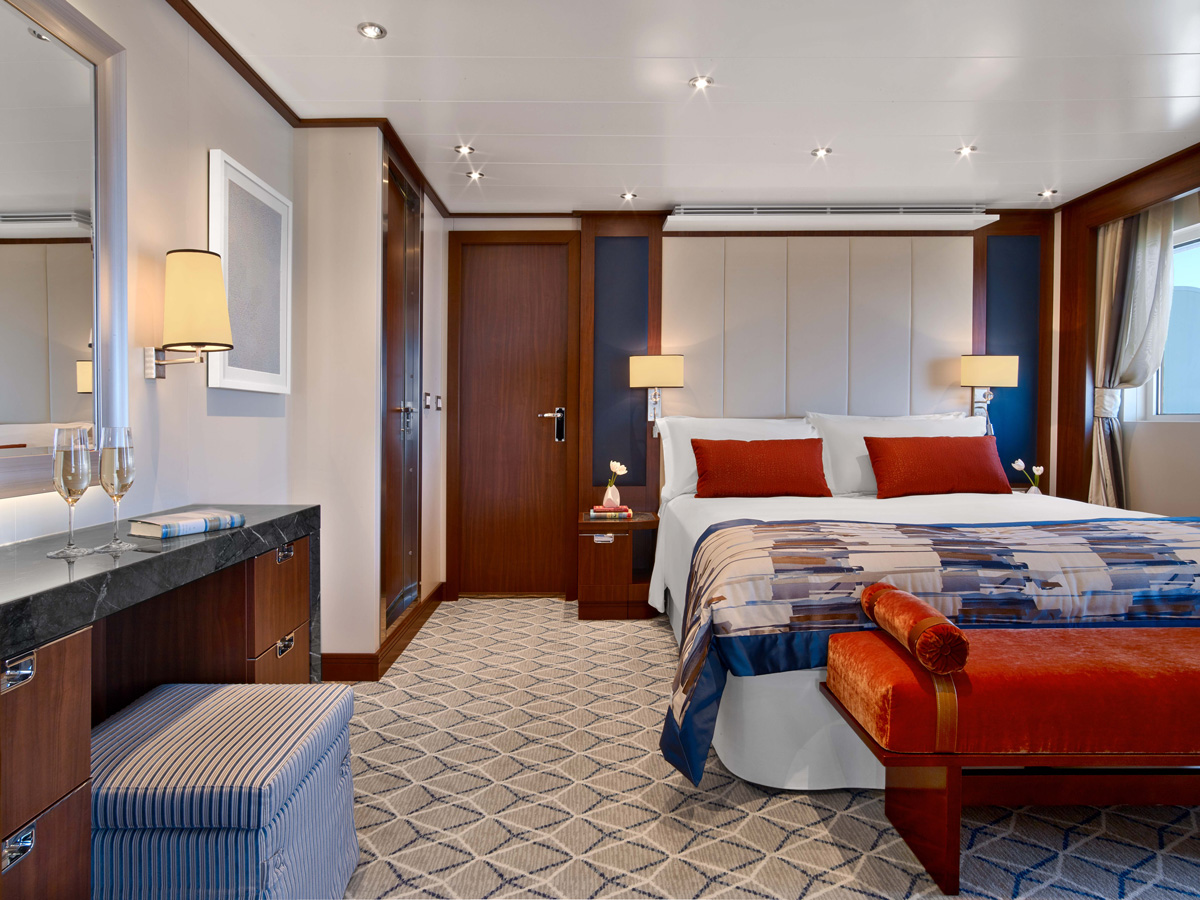
Located on Deck 8; forward suites 800 and 801 inside space of approximately 977 square feet of inside space, plus one veranda of 960 square feet (89 square meters).
Signature Suites feature:
- Expansive ocean views
- Forward-facing windows
- Dining for four to six
- Bathroom with whirlpool bathtub
- Guest bath
- Pantry with wet bar
- Two flat-screen TVs
- Complimentary Internet/Wi-Fi service
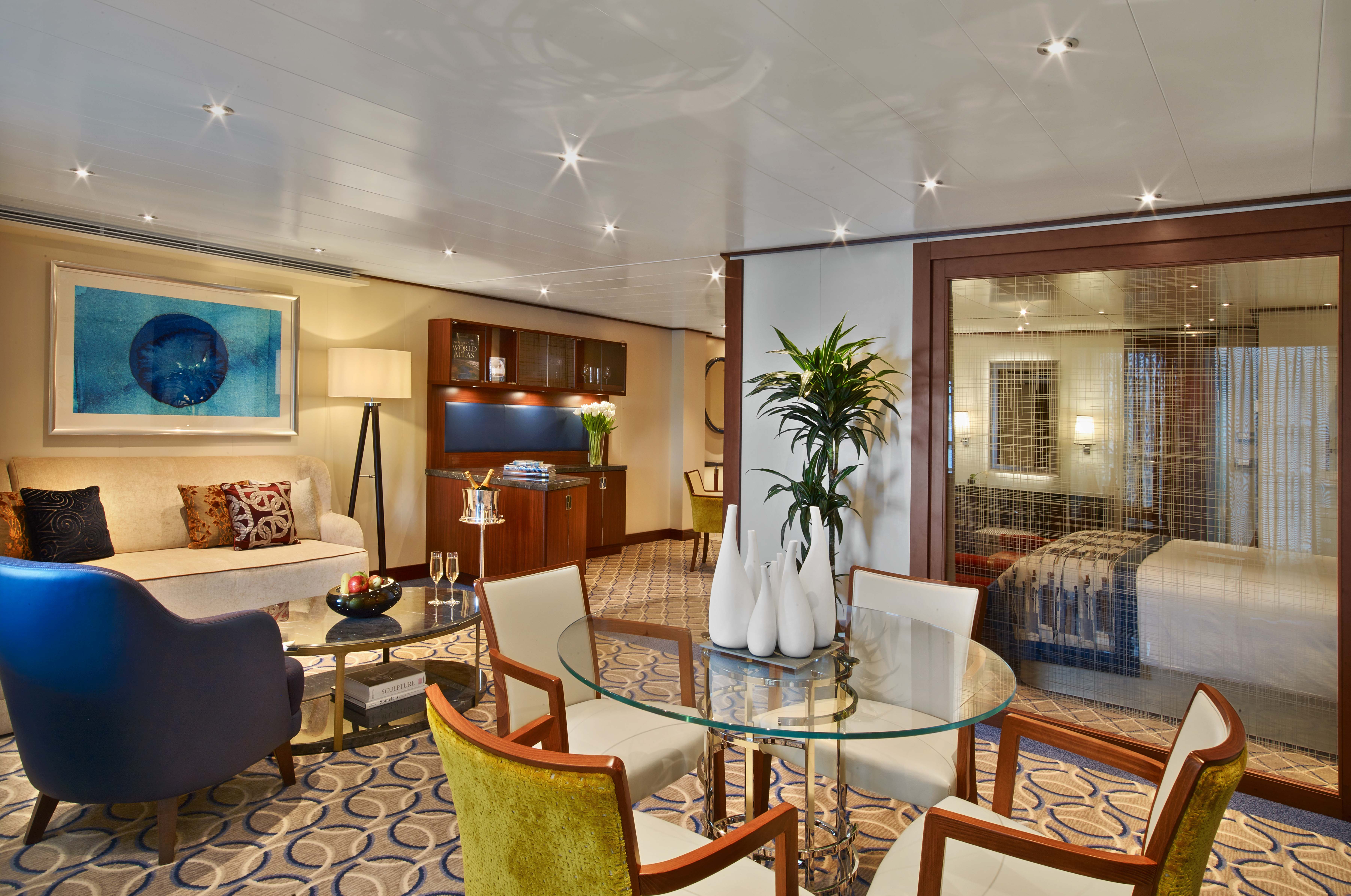
Located on Deck 7, 8, 9 and 10; total inside space of between 576 and 597 square feet (54 and 55 square meters) plus veranda of between 142 and 778 square feet (13 to 72 square meters)
Owner’s Suites feature:
- Expansive ocean views
- Forward-facing windows
- Dining for four to six
- Bathroom with whirlpool bathtub
- Guest bath
- Pantry with wet bar
- Two flat-screen TV
- Complimentary Internet/Wi-Fi service
*Wheelchair accessible suites are roll-in shower only.
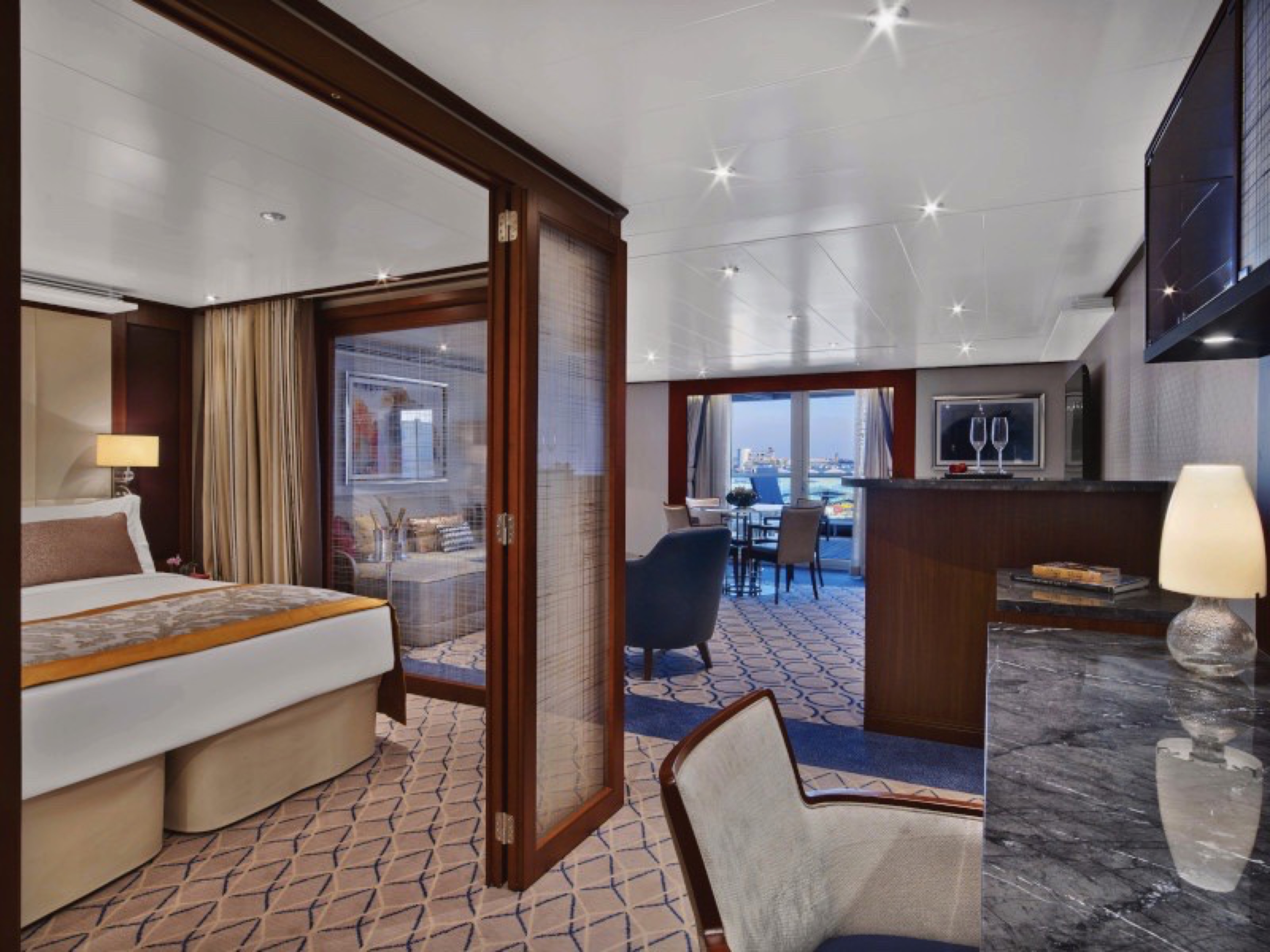
Located on Deck 11; total inside space of between 639 and 677 square feet (59 and 63 square meters) plus one veranda of 254 and 288 square feet. (24 and 27 square meters).
All Penthouse Spa Suites feature:
- Dining table for two to four
- Separate bedroom
- Glass door to veranda
- Two flat-screen TVs
- Fully stocked bar
- Spacious bathroom with tub
- Shower and large vanity
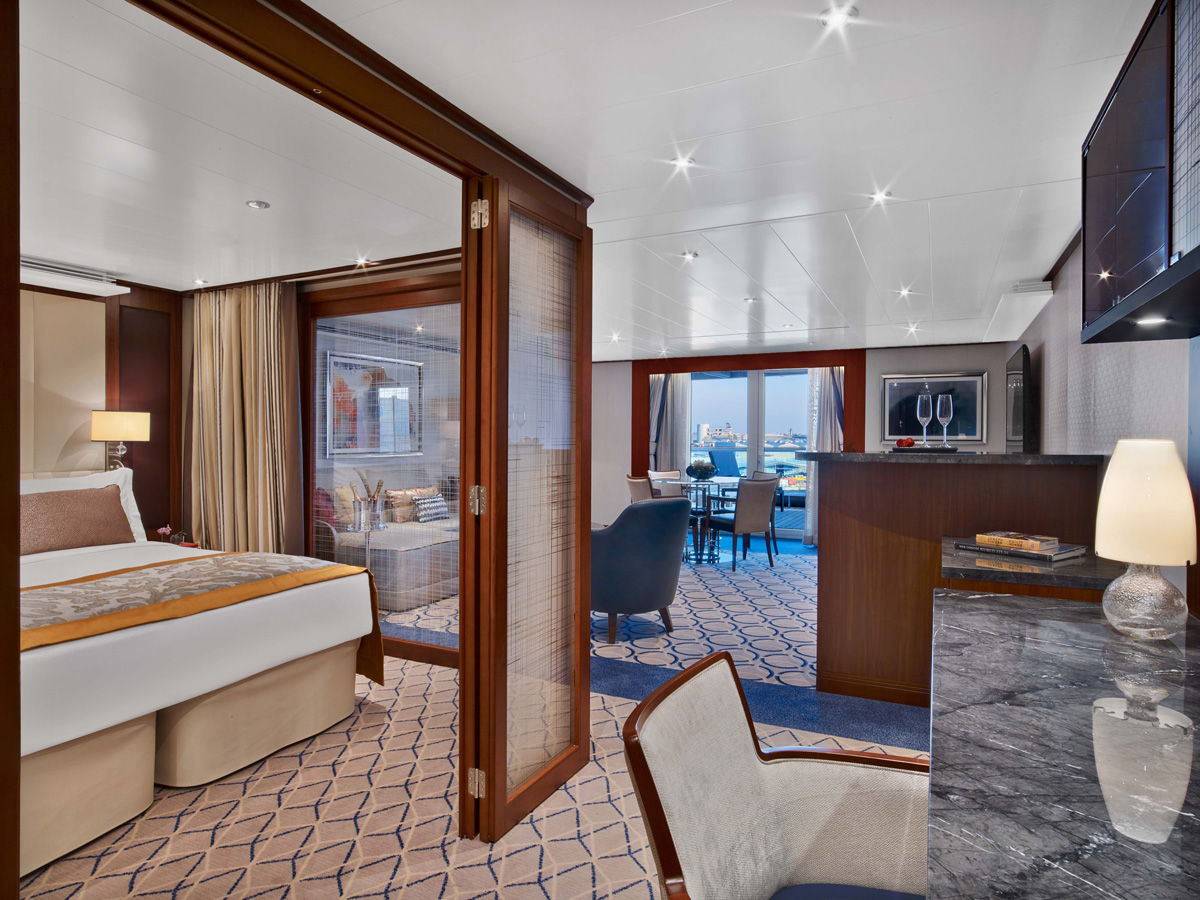
Located on Deck 10 and 11; total inside space of between 449 and 450 square feet (42 square meters) plus one veranda of between 93 and 103 square feet (9 and 10 square meters)
All Penthouse Suites feature:
- Dining table for two to four
- Separate bedroom
- Glass door to veranda
- Two flat-screen TVs
- Fully stocked bar
- Spacious bathroom with tub
- Shower and large vanity

- Dining table for two to four
- Separate bedroom
- Glass door to veranda
- Two flat-screen TVs
- Fully stocked bar
- Spacious bathroom with tub, shower and large vanit
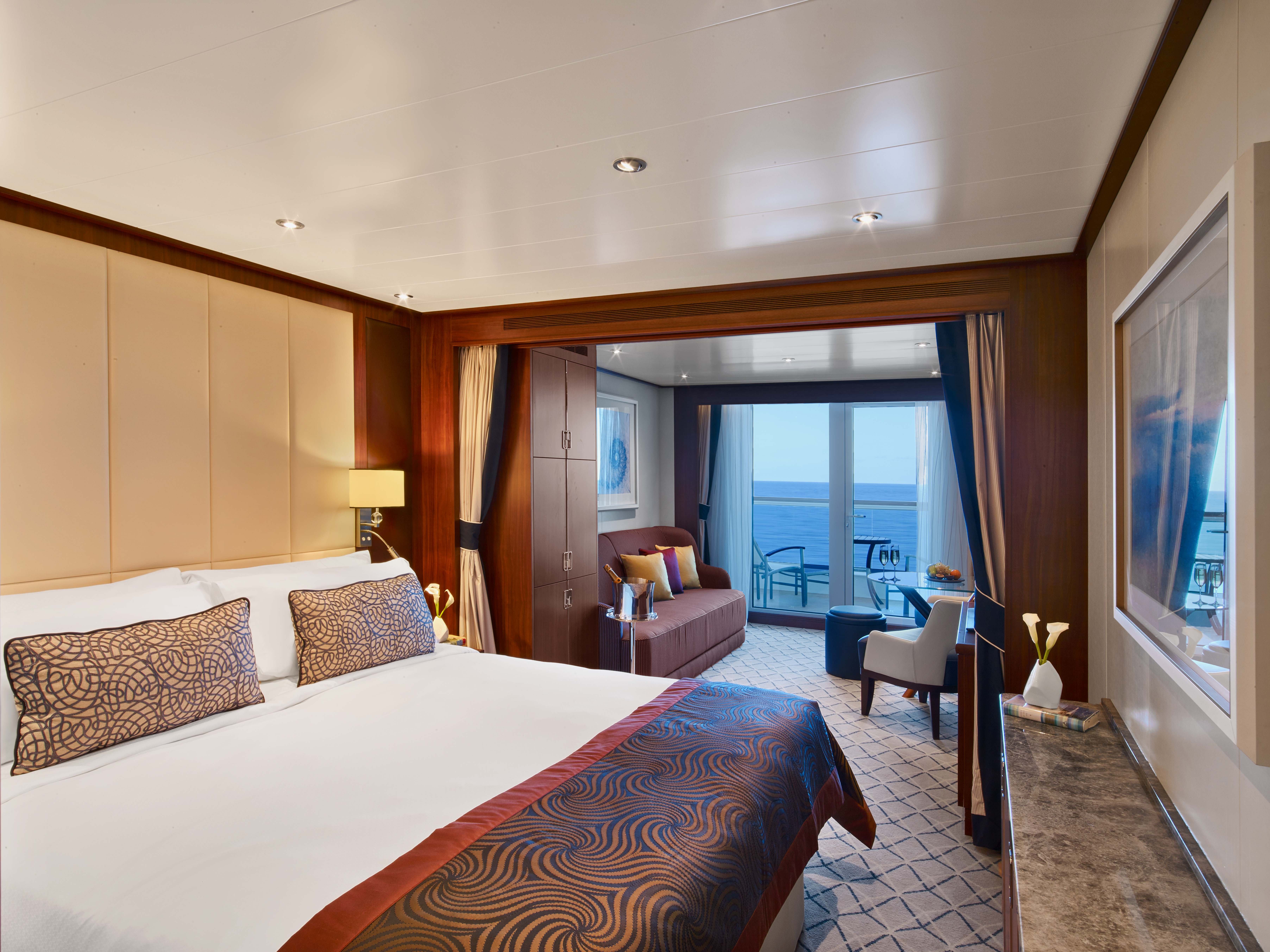
Total inside space of between 246 and 302 square feet (23 and 28 square meters) plus one veranda of between 68 and 83 square feet (6 and 7 square meters)
Guaranteed Suite: For this option we select the location and specific suite for you, and notify you prior to departure. Guests are guaranteed to be assigned a suite in the category selected or higher.
All Veranda Suites feature:
- A full-length window
- Glass door to private veranda
- Comfortable living area
- Queen-size bed or two twin beds
- Dining table for two
- Walk-in closet
- Interactive flat-screen television with music and movies
- Fully stocked bar and refrigerator
- Makeup vanity
- Spacious bathroom with separate tub and shower
*Wheelchair accessible suites are roll-in shower only.
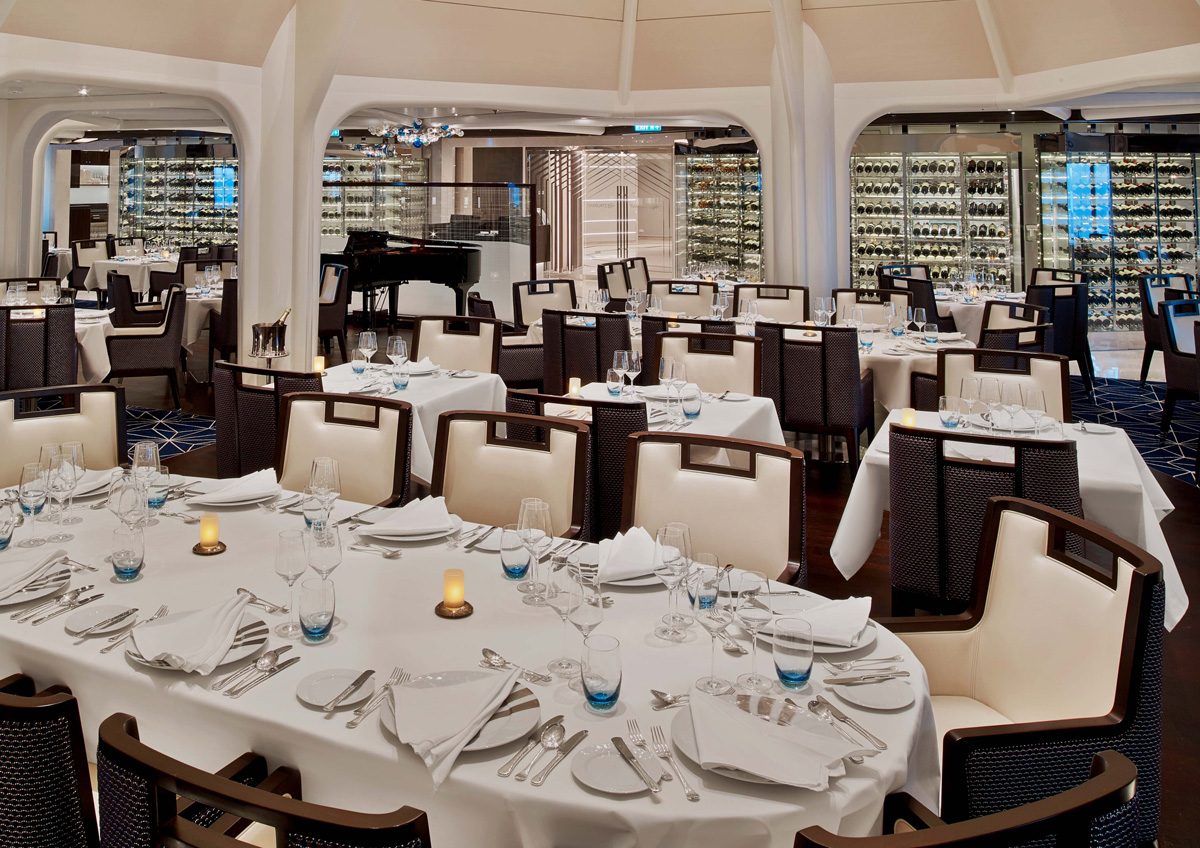
Before Seabourn, open-seating dining on a cruise ship was unheard of. Come when you like, with whom you please, and be seated as you wish. The room is beautiful, the cuisine is exquisite, and the service is simultaneously flawless, friendly and fun.
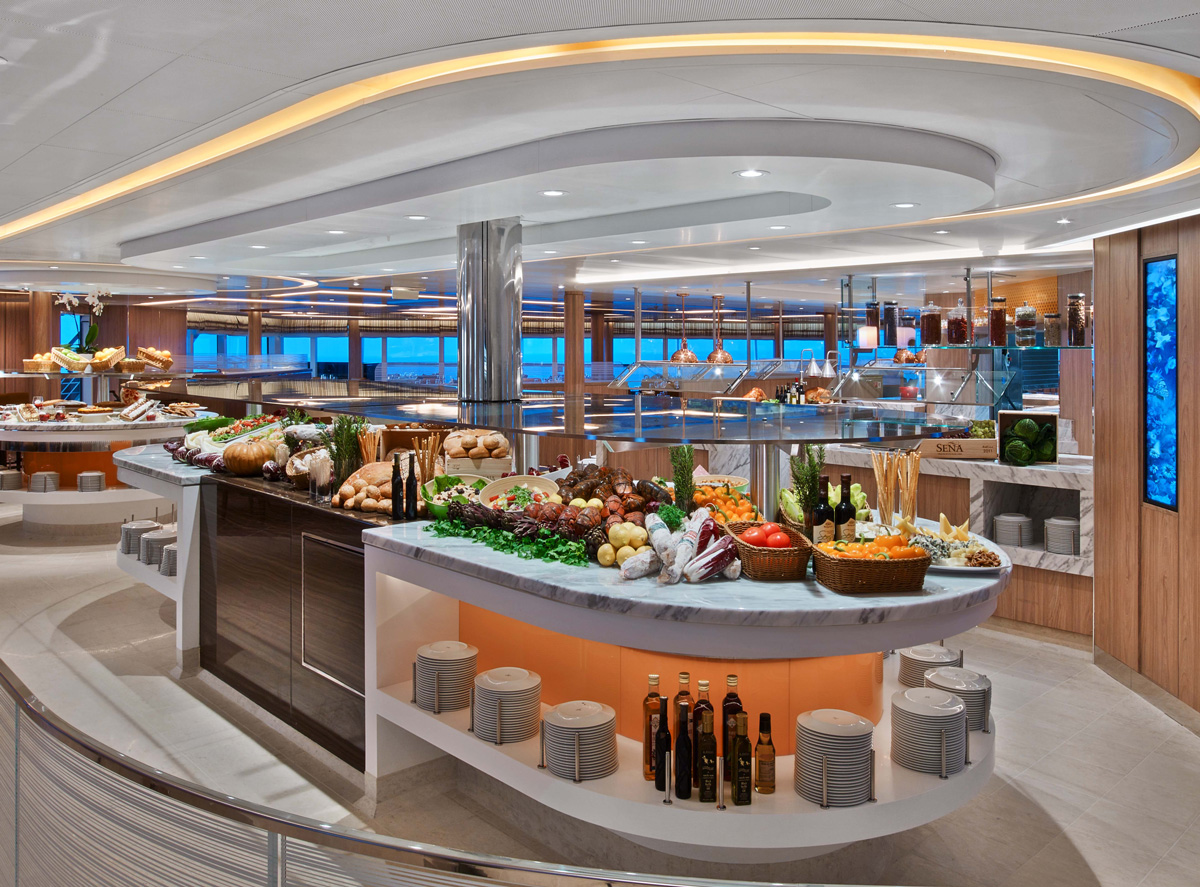
Our more casual, indoor/outdoor alternative, features an open kitchen, lavish buffets or table service for breakfasts and lunch, and serves regionally themed, bistro-style dinners with table service nightly. At The Colonnade, special theme nights feature Chef Keller-influenced dinners that pay homage to his American childhood. His interpretations of classic comfort dishes, such as Clam Bake and BBQ Ribs will be served family-style on platters to complement the essence of sharing in a relaxed spirit of fun and togetherness. *Chef Thomas Keller influenced menu served family-style in The Colonnade are available for reservations once onboard.
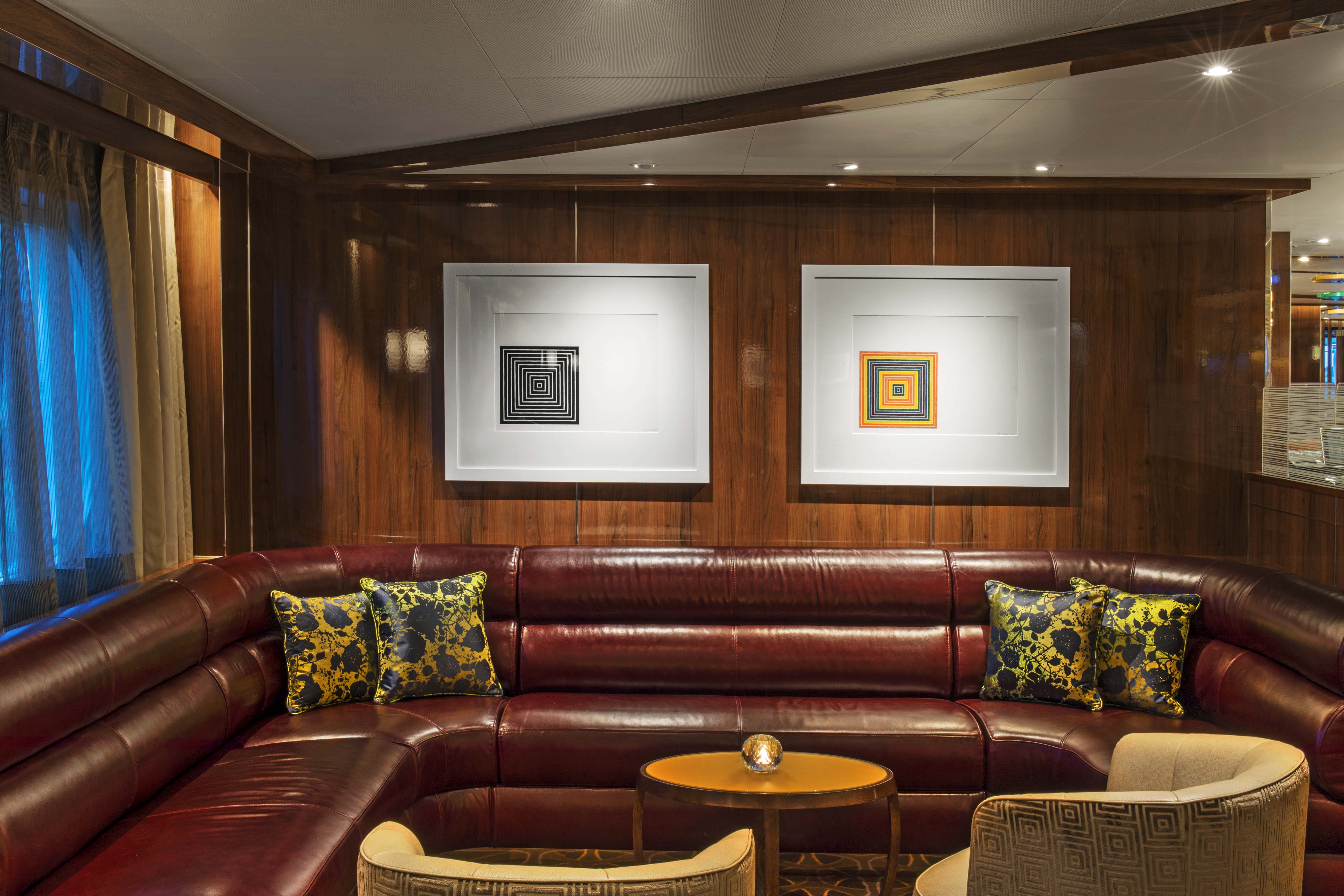
The Grill by Thomas Keller is a unique culinary concept for Chef Keller, exclusive to Seabourn. Guests setting foot inside the elegant dining room will be treated to table-side preparations of Caesar salad and ice cream sundaes as well as a range of other steakhouse favourites like Lobster Thermidor and creamed spinach, presented à la carte. The timeless menu will draw on the freshest products from artisan purveyors. A cocktail program and wine list of domestic and old-world labels complement the menu. For Booked Guests: Dining reservations for The Grill by Thomas Keller can be requested online prior to sailing, subject to availability. Online reservations close 15 days prior to sailing. Due to high demand, online reservations are recommended, however, reservations can also be made on board. One reservation permitted per voyage. For additional details or to make a reservation, log in and customise your itinerary.
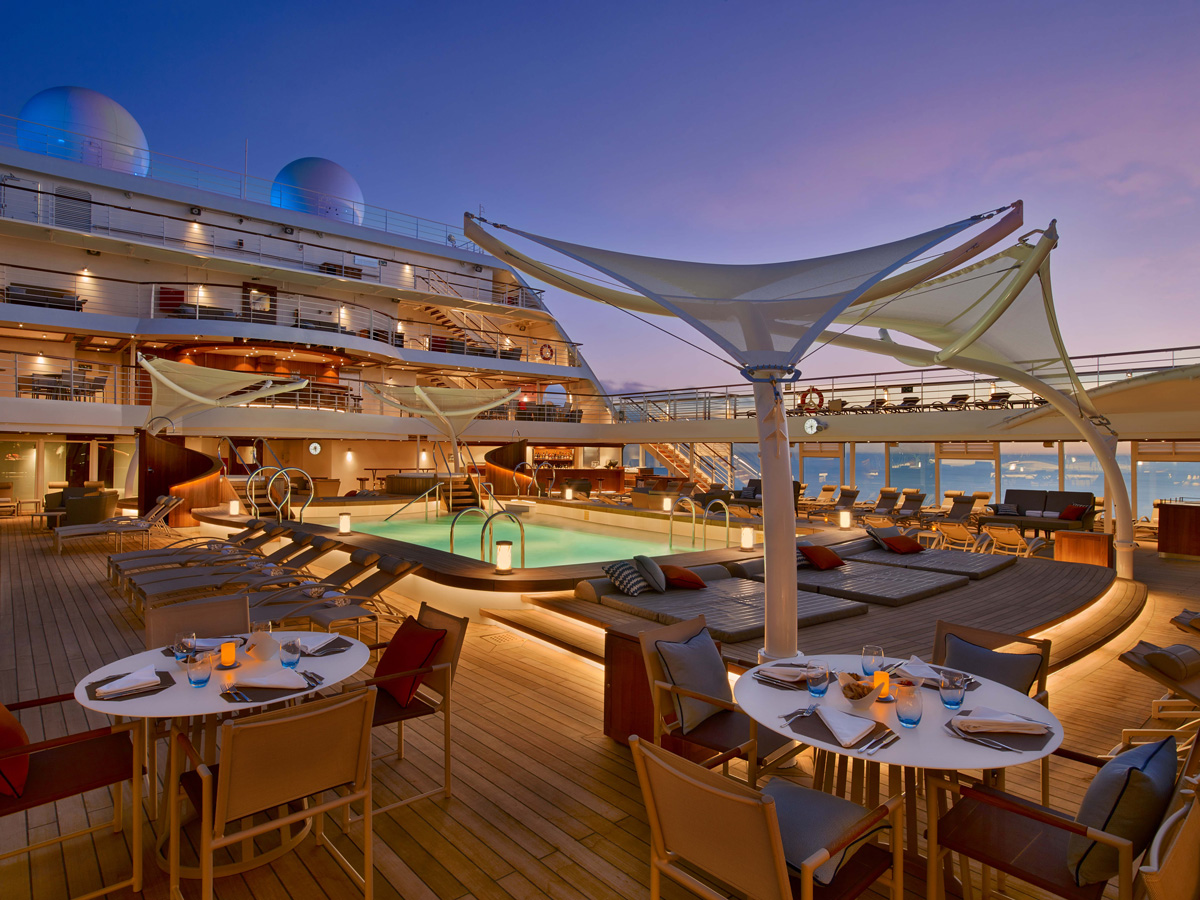
Relaxed poolside dining offering luncheon buffets, salads, soups, grilled specialties and freshly baked pizza. Dinners feature a full menu in an alfresco setting. For The Patio, Chef Keller has developed exclusively for us, a signature Napa burger, as well as an artisanal hot dog dubbed the Yountwurst, named for the hometown of The French Laundry, Ad Hoc, and the original Bouchon and Bouchon Bakery.
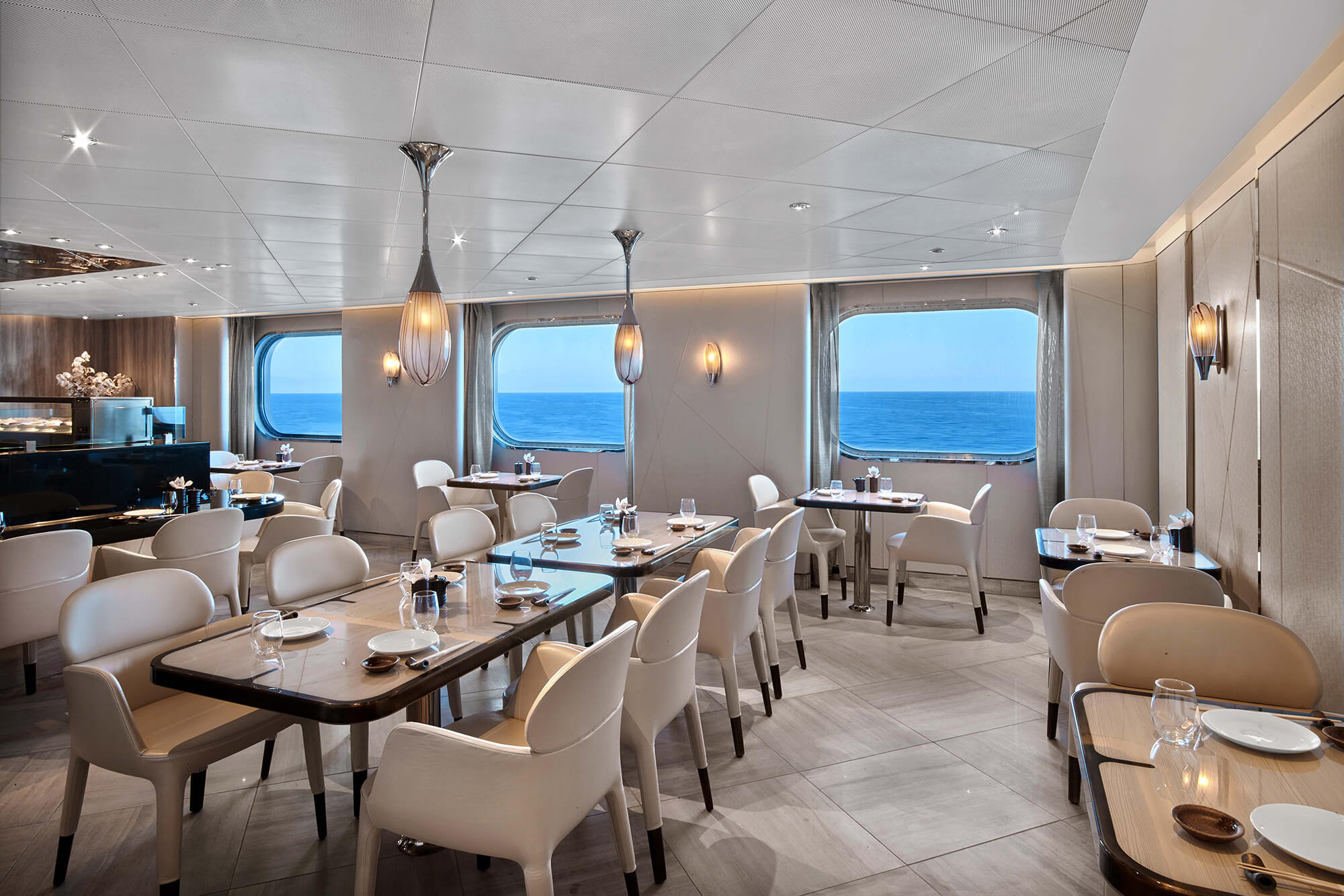
Sushi will debut on Seabourn Ovation when it joins the Seabourn fleet in spring 2018. Seabourn researched the best ingredients and developed a menu that is a perfect blend of authenticity to maintain the root of the cuisine, and a twist of Seabourn’s culinary expertise. The sushi concept is a modern line that is steeped in tradition using the finest ingredients.
Hamachi, tuna, shrimp and other fresh fish products will be shipped from Japan to Sushi and served a la carte for dinner. The menu features caviar and small plates, along with a selection of maki rolls, sushi and sashimi, and salads. In addition, the restaurant will feature three varieties of Bento boxes for lunch: meat, seafood and vegetarian. Guests at Sushi will also find selections of special Sake, fine matcha teas, and desserts to round out their meal.
“This will be a great place to enjoy amazing sushi with a small group of friends, and we’re eager for our guests to enjoy it,” said Richard Meadows, president of Seabourn. “Sushi is intended to be a vibrant space that brings another quality culinary choice to an already diverse lineup.”
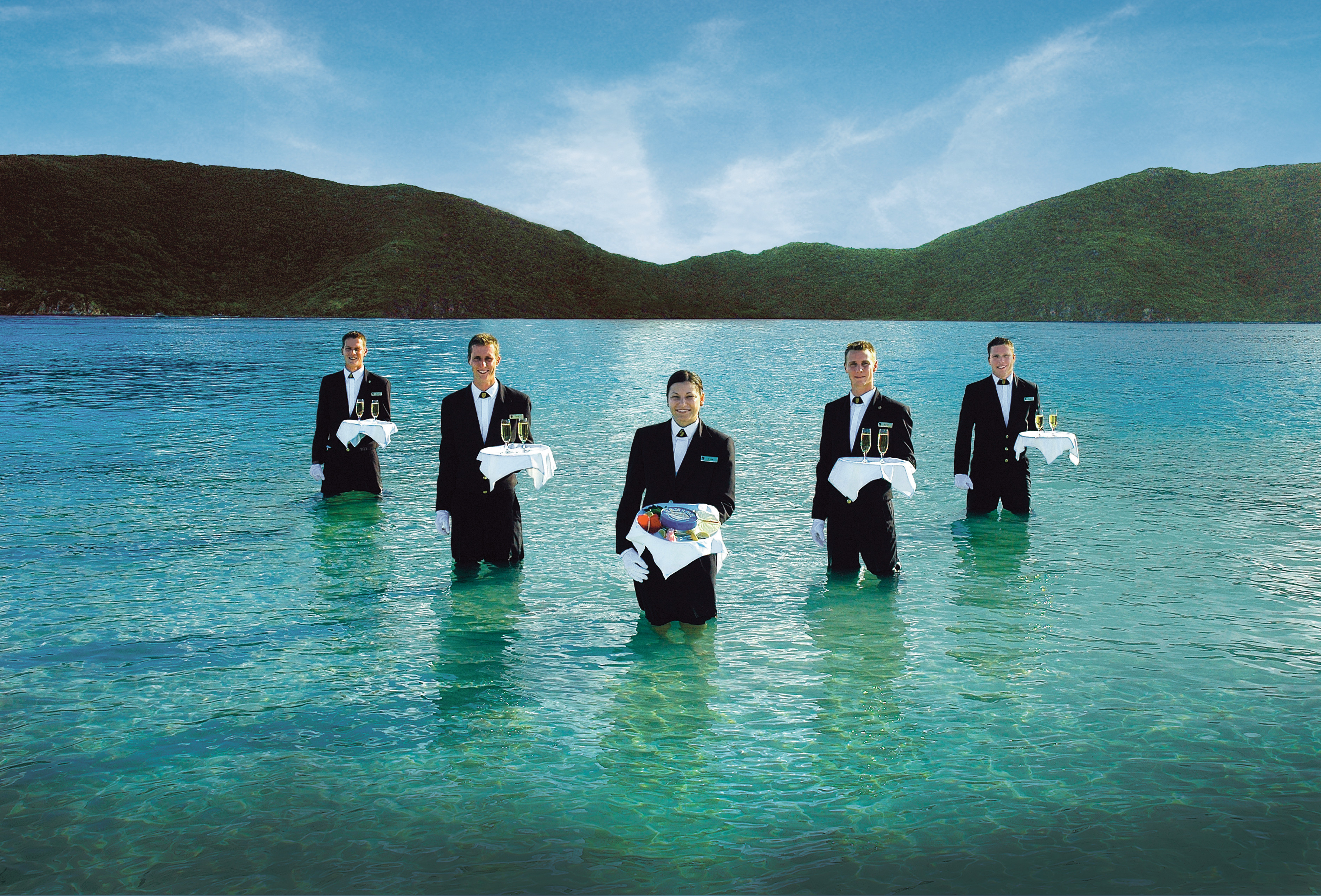
One of Seabourn’s most popular events is our signature “Caviar in the Surf” beach barbecue. Our uniformed staff members plunge into the water and invite guests to wade in and get iced champagne and caviar at a surfboard bar. The event includes a lavish barbecue lunch, watersports, music and ample time to soak up the sun on a white-sandy beach.
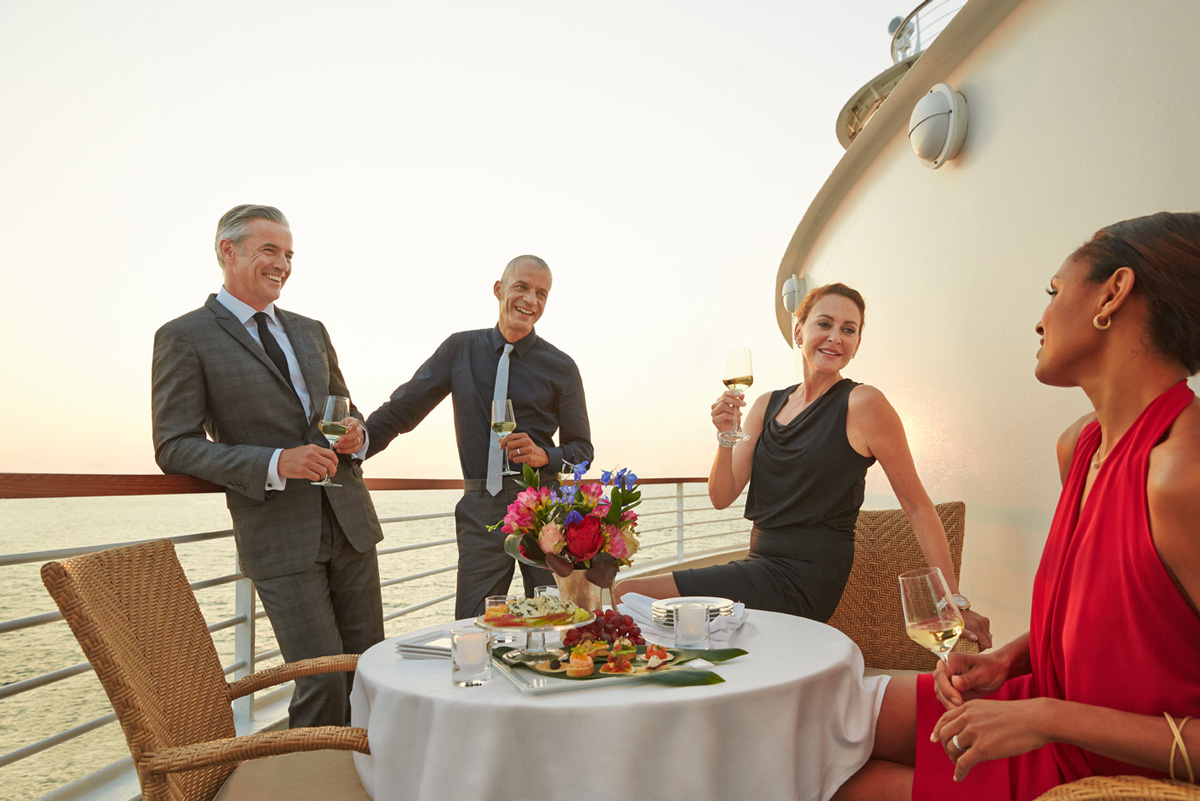
Seabourn is pleased to offer a varied menu available around the clock for service in your suite. You may also order dinner from The Restaurant menu and have your meal served, course by course, in your suite or on your veranda.
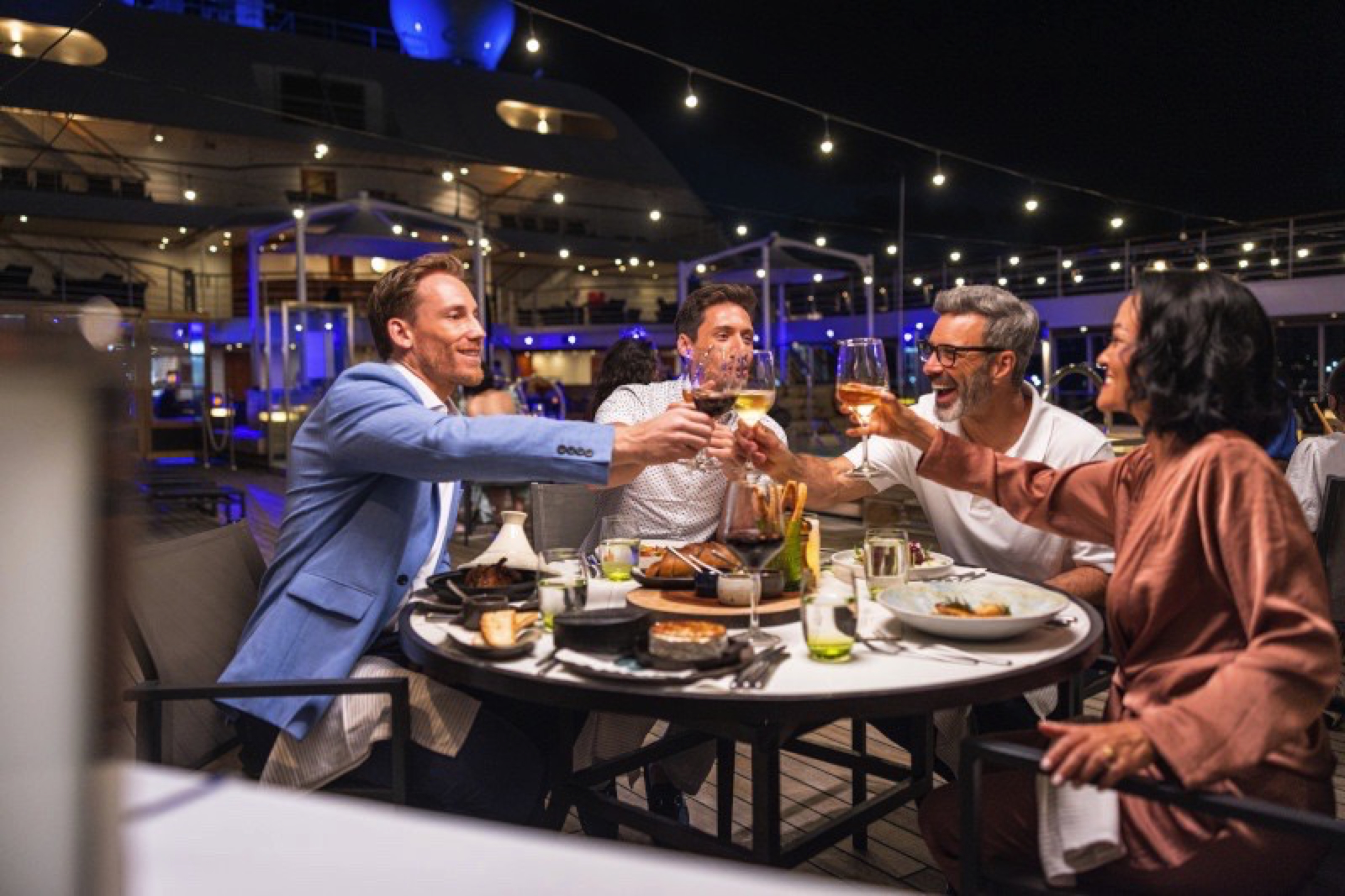
Each evening, our chefs create an array of fresh, inventive dishes from around the world, served in a relaxed setting under the stars.

For meetings and gatherings, our ships offer meeting rooms that can accommodate up to 40 guests. The meeting rooms can be arranged to guests’ specifications including theatre-style or with tables; and each of the rooms have large-screen TVs for presentations. Guests may also reserve the Card Room when available. Our crew members are happy to assist guests with meeting room reservations and setup.

Seabourn is pleased to announce in partnership with The Onboard Spa by Steiner, we have created a fleet-wide mindful living program offering guests a holistic spa and wellness experience that integrates physical, social, environmental and spiritual well-being. The new Spa and Wellness with Dr. Andrew Weil program will be the first-ever of its kind at sea. The new program will be led by the newly established position, The Wellness Guide. The Guide, will be a certified yoga and meditation practitioner who will inspire and educate all guests through various complimentary classes and gatherings throughout the voyage. Guests who choose to participate in this new program will have a cruise experience that is further enhanced by a holistic mind and body perspective. The program kicked off with Dr. Weil sailing on Seabourn Encore’s inaugural cruise in January 2017. The program will be rolled out throughout the entire Seabourn fleet in 2017, including Seabourn Ovation in spring of 2018. Dr. Weil will sail on a different Seabourn ship each year where he will deliver a 60-minute lecture for guests and will also offer smaller informal group discussions. A separate team of wellness experts will also make regular visits to spa facilities throughout the Seabourn fleet. Central to the program is the daily practice of meditation and yoga through a selection of complimentary sessions. Guests can experience Mindful Meditation, which will introduce positive affirmations and mantras they can reflect on throughout the day. There will also be daily restorative yoga classes which will continue to focus upon the mantra and positive affirmations. Yoga classes will be varied, offering guests the ability to choose classes that focus on various physical issues, such as yoga to heal back and joint pain, headaches and body alignment, as well as yoga to enhance creativity, mental focus and happiness. Classes will focus on mind, body and spirit over a period of seven days, and will change daily with a new theme. Integral to the wellness program are enriching complimentary Mind and Body seminars designed to educate guests on philosophies and practices that are aligned with the program’s mission. Each presentation will aim to empower guests with ideas and practices that enhance well-being and increase the awareness of connection between mind, body, environment and wellness. Seminars are created by Dr. Weil and Steiner’s Wellness professionals, many of which will be based upon Dr. Weil’s teachings, and will explore the fields of the healing arts. The launch of the Mind and Body Wellness Program with Dr. Andrew Weil deepens the already wellness-focused Seabourn spa program that offers a wide range of body massages, facials, fitness and beauty treatments. Lending itself to the program is the powerfully aromatic Thai Poultice massages that use the traditionally prepared steamed herbs of Camphor, Kaffir Lime, Prai, Turmeric and Lemon Grass in muslin poultices to melt away stress and tension, or nourishing desecrated Coconut that nurtures the body with soothing fats and lipids. Guests will also find Deeper than Deep Hot Stone Massage, Bamboo Massage and Freestyle Massage to engage their minds and bodies.

The art of conversation has always been central to the Seabourn experience.
World’s Finest Ultra-Luxury Cruise Line™
Our voyages attract interesting, interested people — people who enjoy talking together, sharing their interests, their adventures and discoveries, and their life stories with longtime and newfound friends. Their enthusiasms and curiosity are far-ranging, and these are what spark their desire to travel the world.
To encourage and enhance this satisfying aspect of your Seabourn voyage, we invite luminaries of particular interest and accomplishment to join our guests on board — and bring fascinating insights, expert opinions and delightfully entertaining diversions to the conversation.
Daring explorers, heralded chefs, learned scholars, celebrated performers and renowned experts from every arena of the arts, sciences, politics and the humanities share your journey on our intimate ships. They each bring skilled presentations of their expertise for guests to enjoy. But just as importantly, they participate in the daily social scene, sharing meals, adventures ashore and casual chats throughout the voyage. On some ships, they lecture. On Seabourn, they join the conversation.
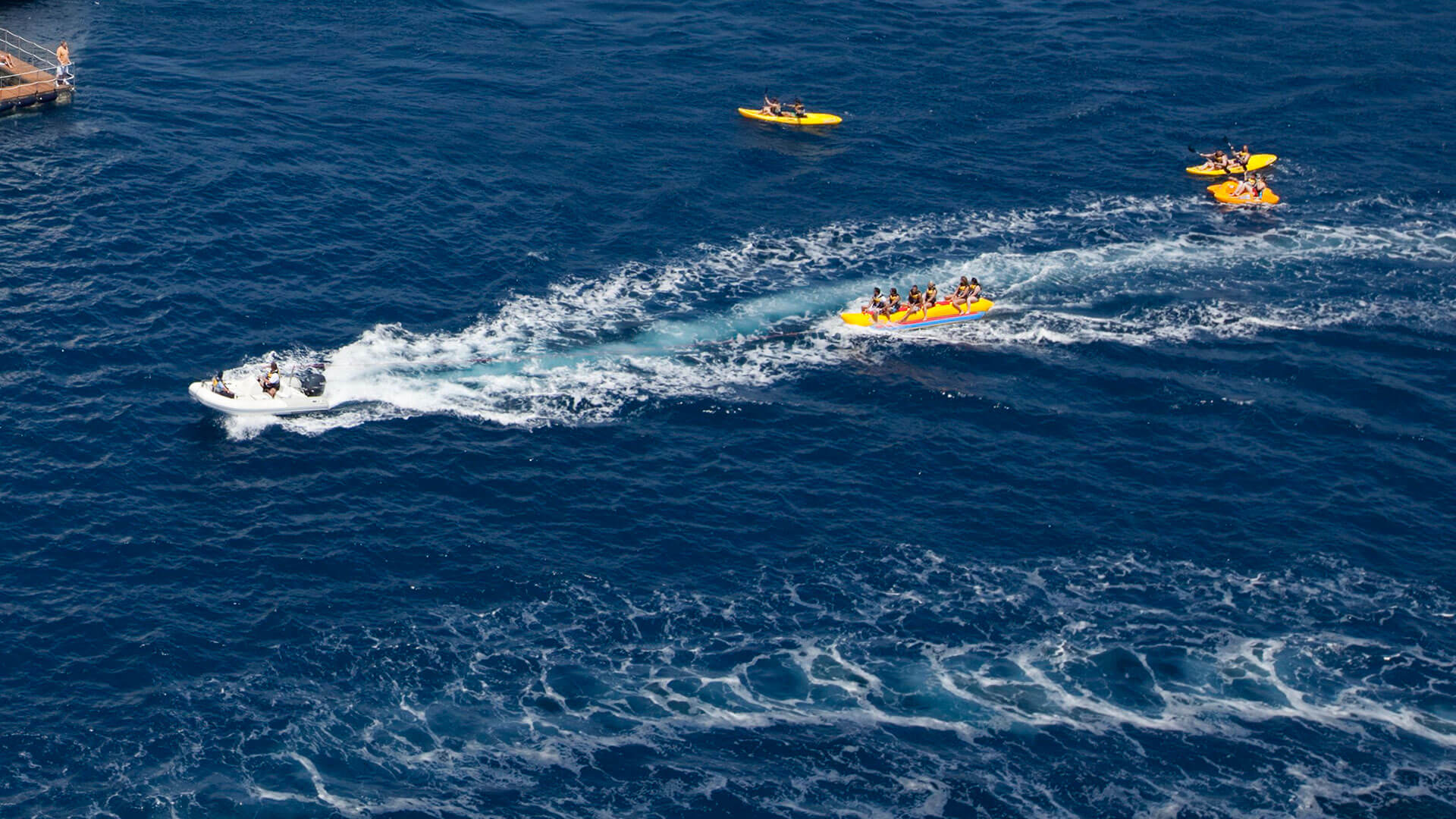
One of Seabourn’s most popular guest offerings is Marina Day. Available at select destinations, this fun-filled day features complimentary water-sports either from the ships’ unique, retractable Marina platform or from a beach, which is typically on the same day as when the line’s signature Caviar in the Surf and beach barbecue is offered. Guests may enjoy a wide array of water-sports, including kayaks, pedal boats, donut rides, banana boats, paddleboards, waterskiing and more. Guests can be as relaxing or adventurous as they choose to be. It’s not to be missed!
*Please refer to our brochures or www.seabourn.com for itineraries where water-sports may be available.
**Please note that that water-sports are weather and ocean conditions permitting and at the discretion of the Captain.
***Children under the age of 13 must be accompanied by a parent or legal guardian.
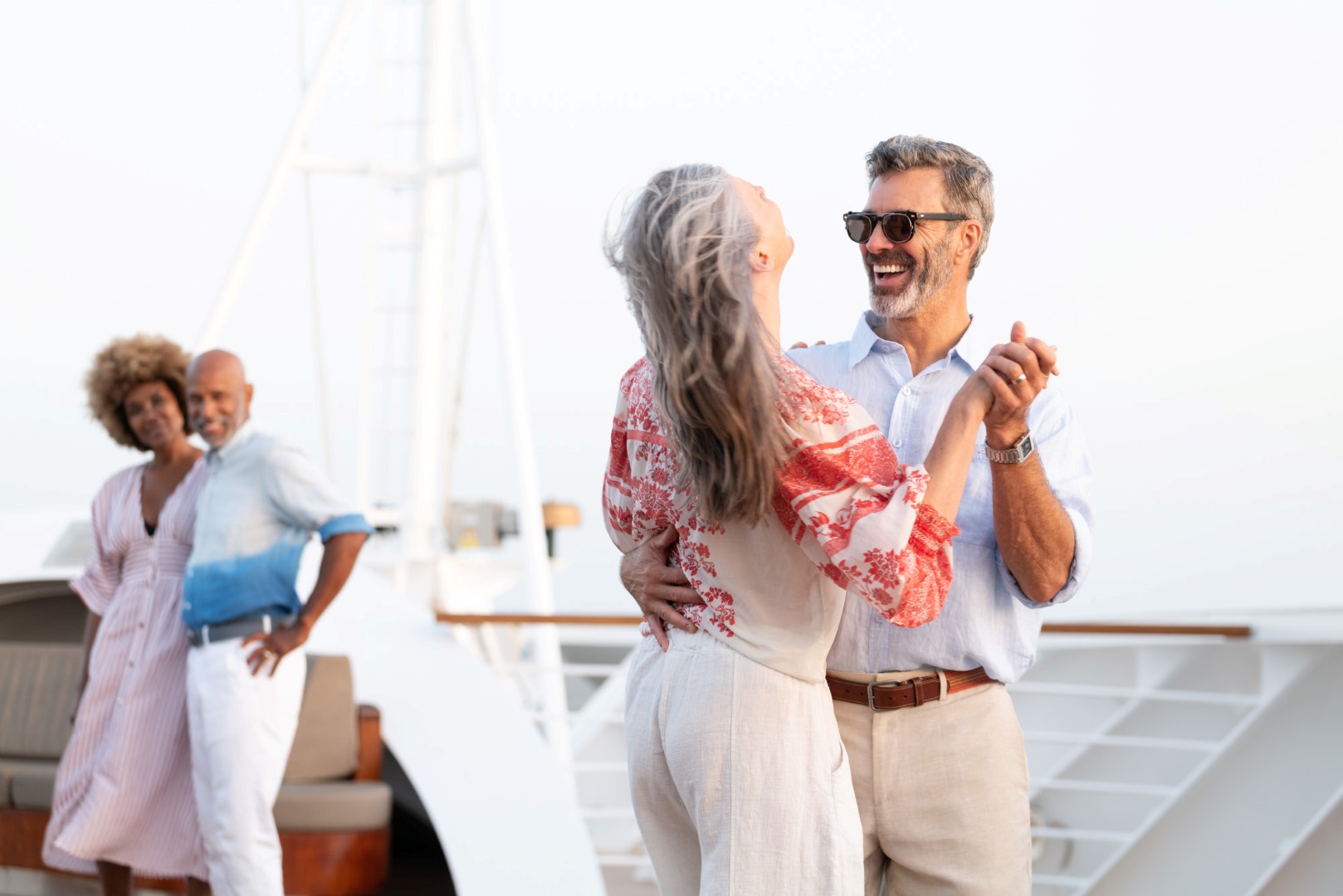
One of the most FUN evenings during any cruise, Evenings Under the Stars is a night where guests can let their hair down and simply be in the moment. Enjoy Let’s Dance! with great live music, interact with fellow travelers and be spoiled in true Seabourn style by our food and beverage team with Desserts Under the Stars. A signature event, this dance party has been a part of the line’s rich culture, and a Seabourn cruise is not complete without Let’s Dance! and Desserts Under The Stars. Weather permitting, this high-energy dance party is hosted poolside and under the stars by the entire entertainment team, featuring performances by The Band, vocalists and dancers. There is even the possibility your Cruise Director and Assistant Cruise Director might jump on stage to perform, as well! Guests can expect music that appeals to everyone’s taste with a great mix of hit songs. It’s a real treat and guests LOVE Evenings Under the Stars!

Shopping with the Chef — at local food markets. Shop a bustling Sicilian market, gather spices in Istanbul or explore the local wines of Tuscany and Provence. Wherever you are in the world, you’ll enjoy an insider’s look at unique regional markets with an expert Seabourn chef as your guide.
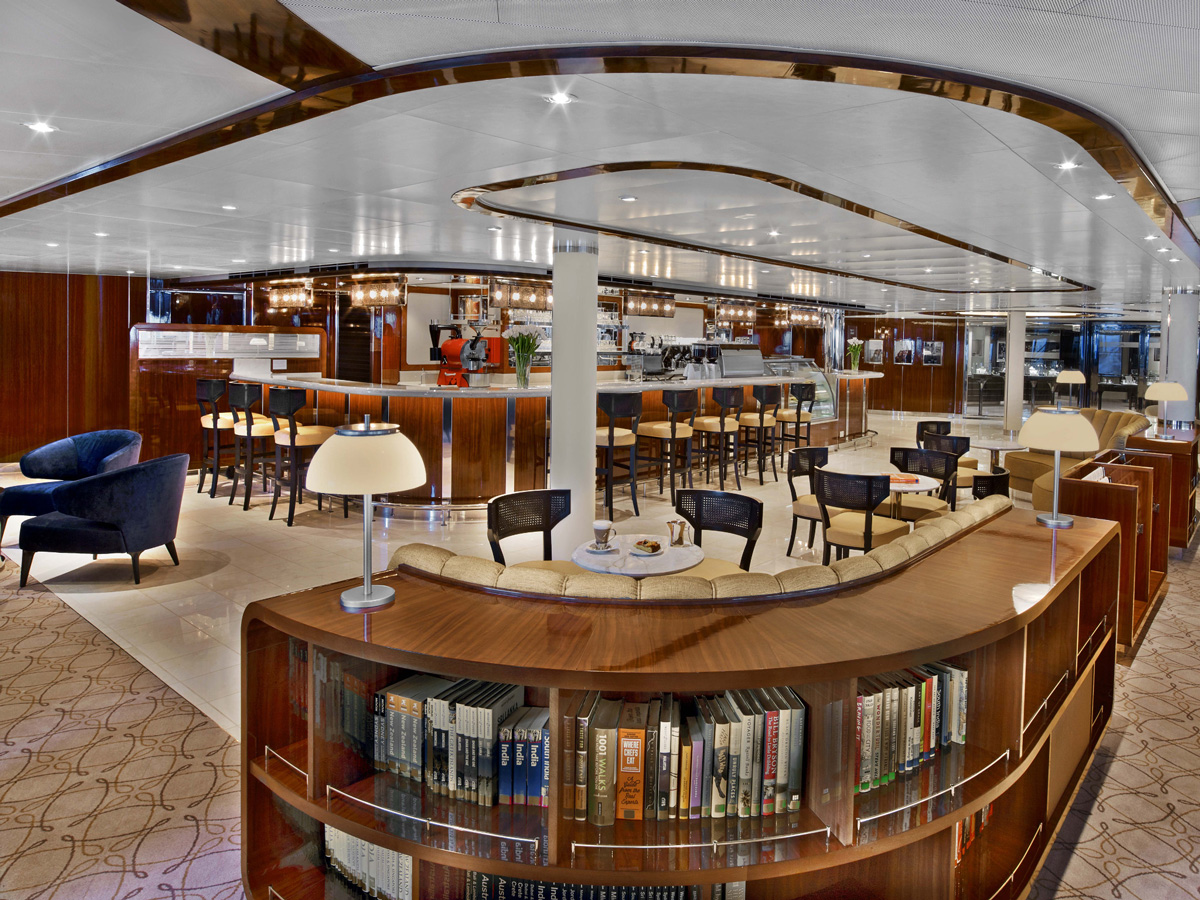
A place to enjoy your newspaper or to socialize with your fellow passengers, Seabourn Square is what you’re looking for. Seabourn Square is the true ‘living room’ of the ships. An inviting sociable space where guests will find a charming European style coffee bar, Seabourn Square has been designed as an open, comfortable environment for guests to interact with onboard officers and the expedition team and engage in conversation with family and new friends. The space is also home to the highly-trained Guest Services staff, who provide a range of concierge services such as general ship information, assistance with special service requests, port and travel information, and more.
A selection of coffees are prepared by the skilled onboard baristas some using beans roasted in Seabourn Square. For those feeling a bit hungry, Seabourn Square offers freshly made pastries and other on-the-go breakfast items in the morning, as well as an assortment of light sandwiches and desserts later in the day, along with a selection of artisanal gelati made on board. Guests will also find a wide range of books in the adjoining library, with a host of titles on subjects such as adventure, expeditions and other topics of interest to enjoy while onboard. Staying current with the news is made easy with a selection of printed newspapers from around the world and tablets featuring the Press Reader news application available to browse each day.
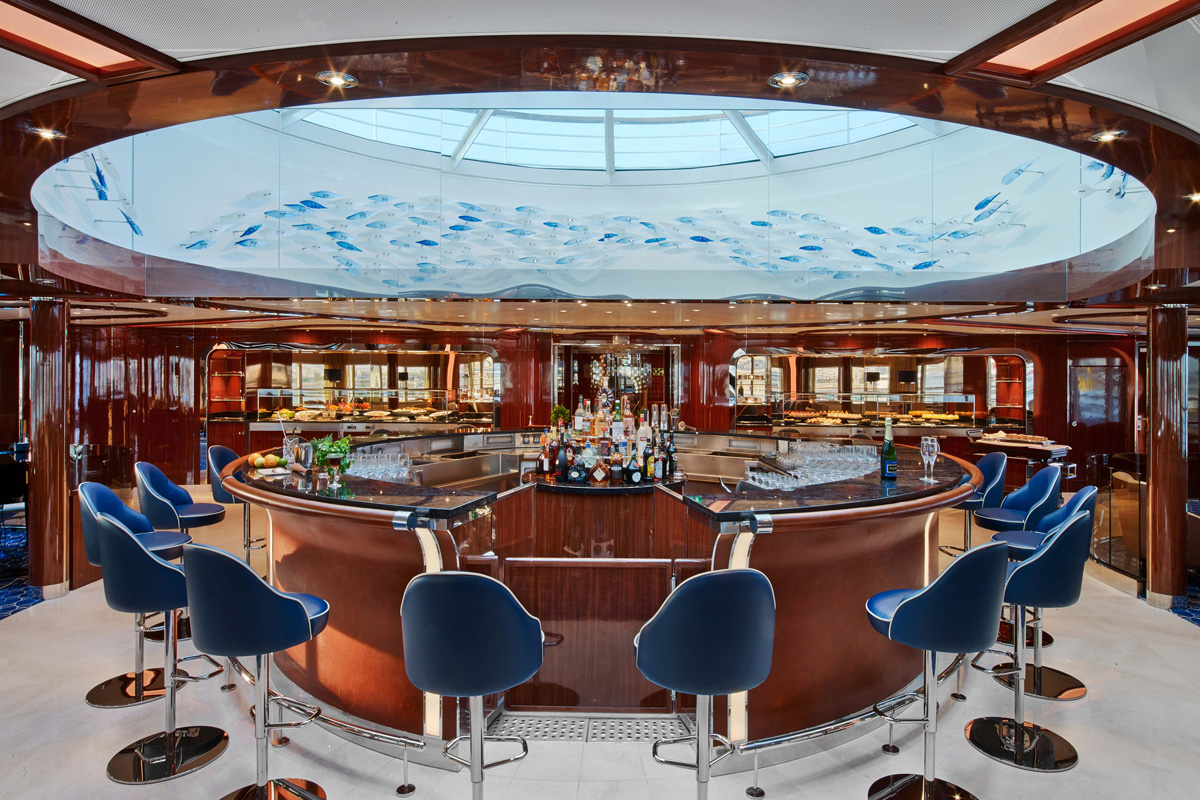
Enjoy this stunning lounge with a bar and panoramic views. Enjoy coffee and tea served every morning, and drinks before or after dinner.
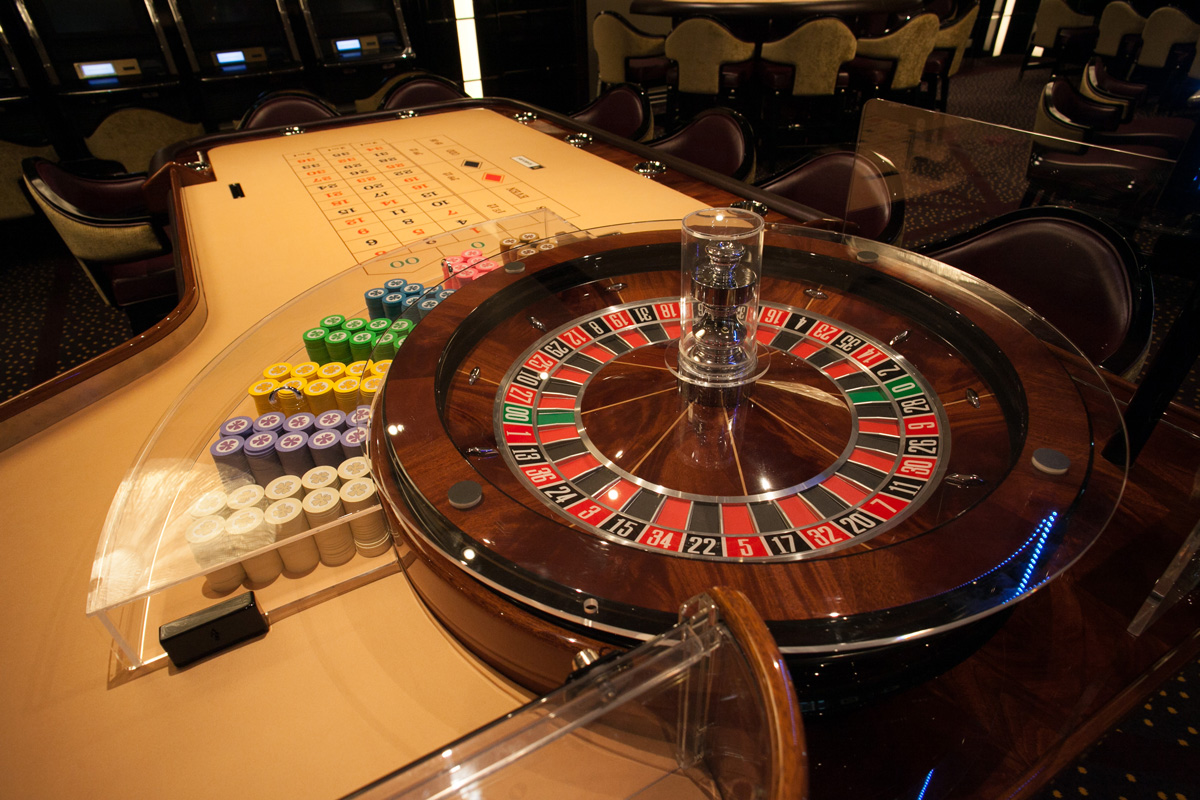
World’s Finest Ultra-Luxury Cruise Line™
The Seabourn casino offers a handsome, well-appointed enclave for those attracted to games of chance and skill. Relax and test the odds on various mechanical games or pit your skills against personable, professional dealers at blackjack or poker tables.
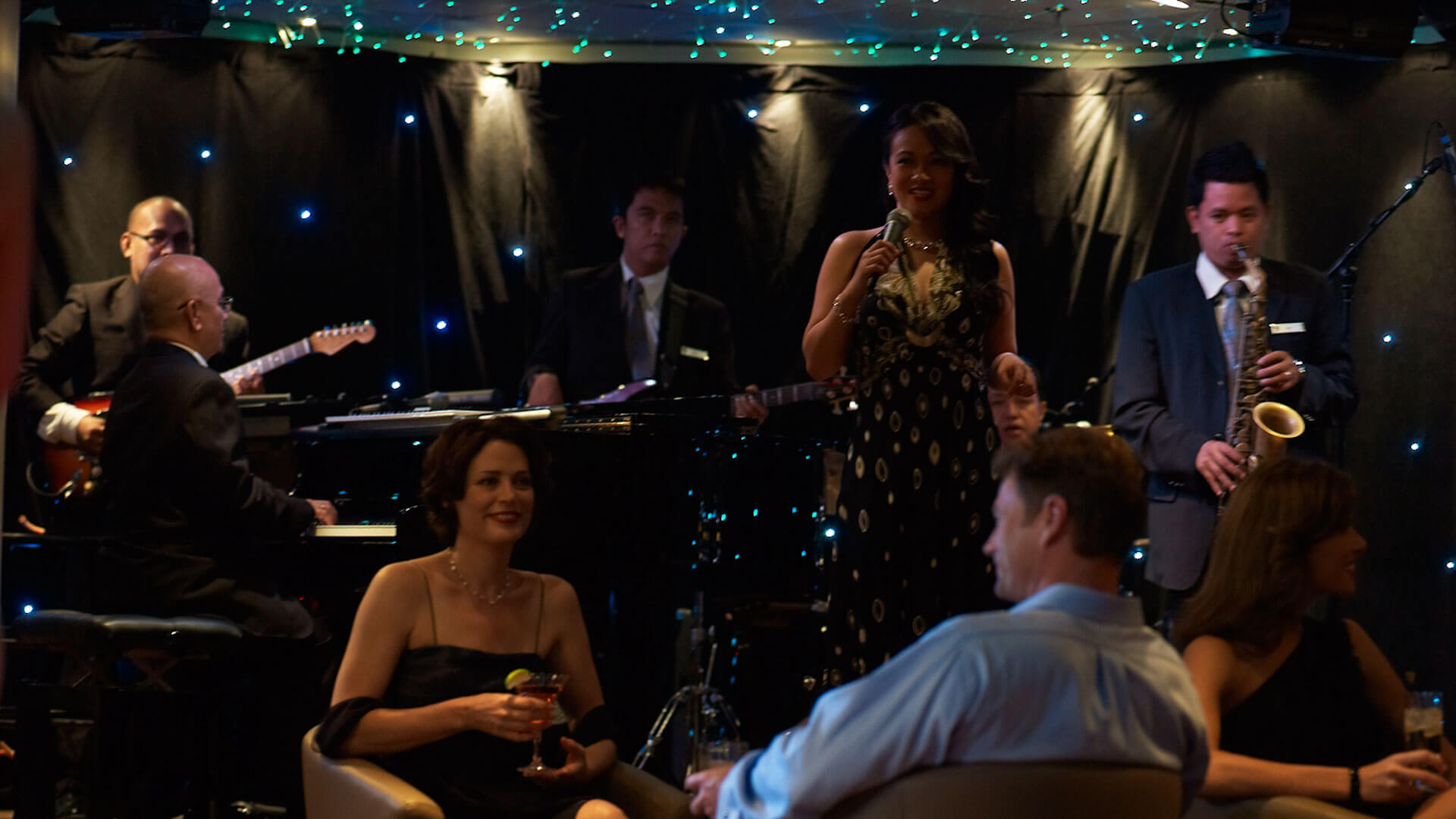
The liveliest lounge on board is the scene of daily afternoon tea service. It is a popular spot for pre-dinner drinks and dancing to live music. After dinner, the dancing music continues, and later a DJ spins dance music until late at night. Another terrace of open deck aft of The Club boasts a plunge pool and two small whirlpool spas.

The ship’s main showroom can accommodate all guests, though it seldom does because of the variety available. Lectures, cooking demonstrations, movies and other gatherings are held here in the daytime. In the evenings, live music for dancing before dinner gives way to vocal production shows, cabaret performances, comedy, and classical recitals, as well as more dancing later.
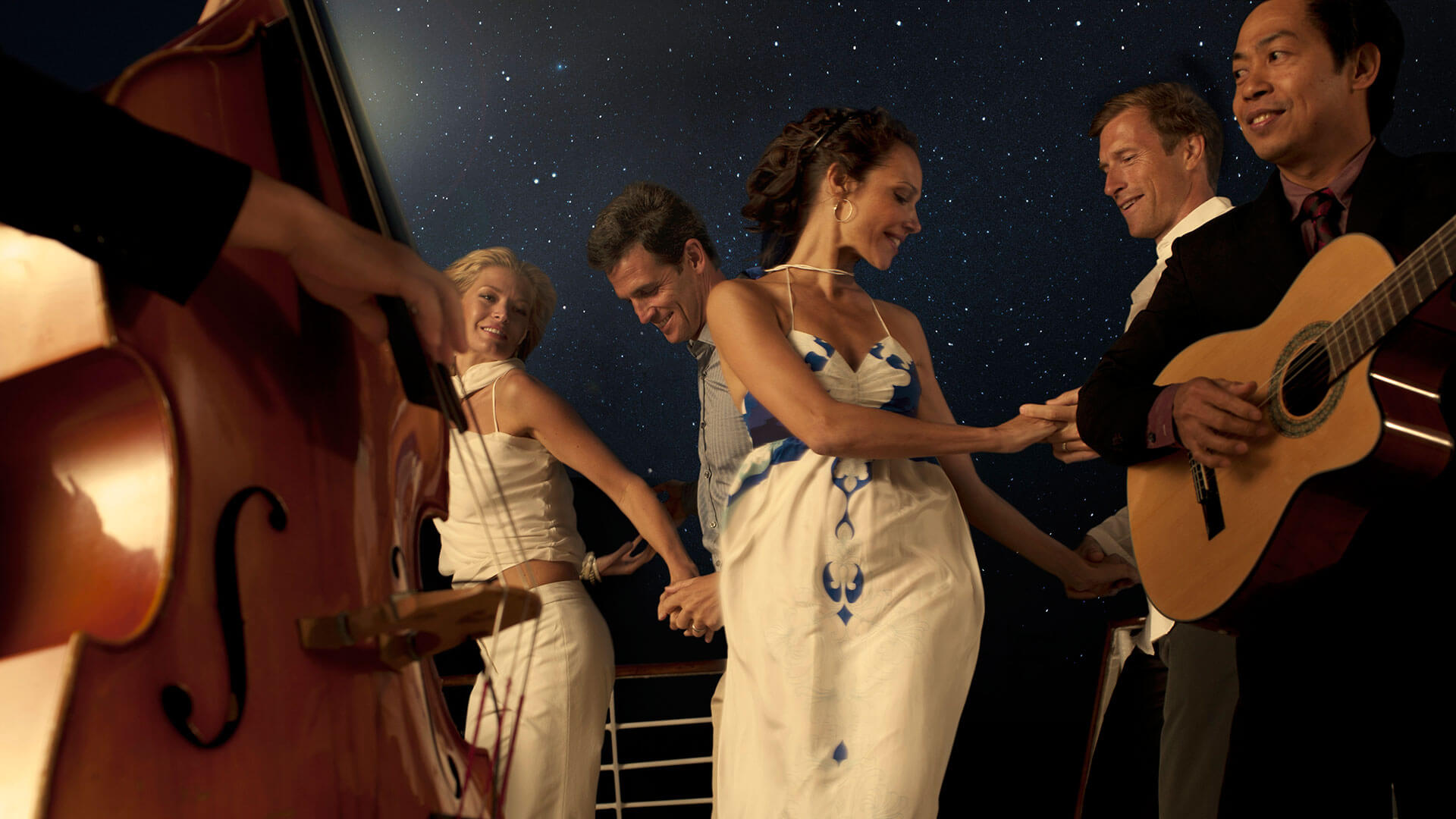
One of the most FUN evenings during any cruise, Evenings Under the Stars is a night where guests can let their hair down and simply be in the moment. Enjoy Let’s Dance! with great live music, interact with fellow travellers and be spoiled in true Seabourn style by our food and beverage team with Desserts Under the Stars. A signature event, this dance party has been a part of the line’s rich culture, and a Seabourn cruise is not complete without Let’s Dance! and Desserts Under The Stars. Weather permitting, this high-energy dance party is hosted poolside and under the stars by the entire entertainment team, featuring performances by The Band, vocalists and dancers. There is even the possibility your Cruise Director and Assistant Cruise Director might jump on stage to perform, as well! Guests can expect music that appeals to everyone’s taste with a great mix of hit songs. It’s a real treat and guests LOVE Evenings Under the Stars!
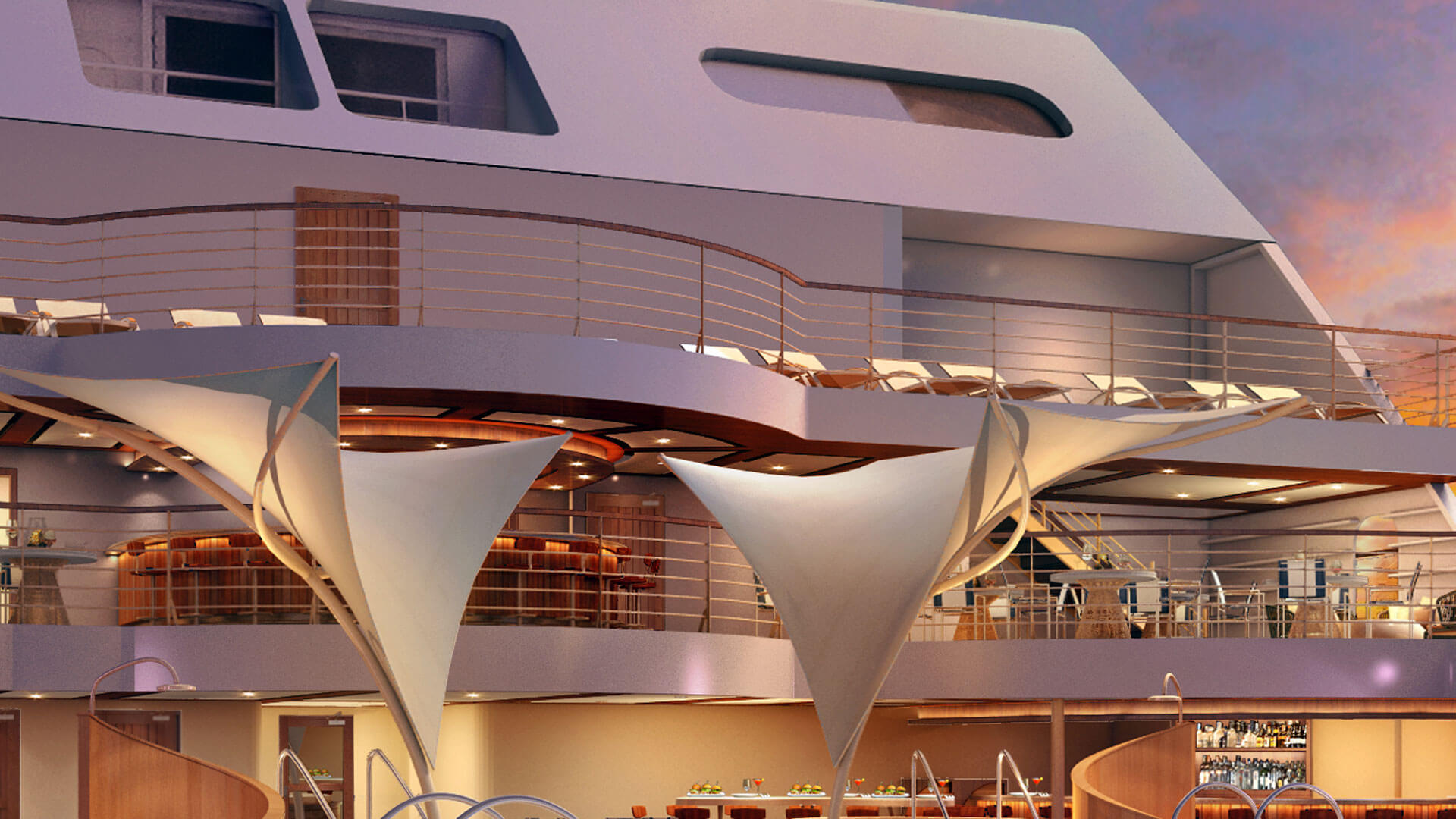
The Sky Bar is a place to enjoy a refreshing tropical beverage during the day, or an evening cocktail under the stars.
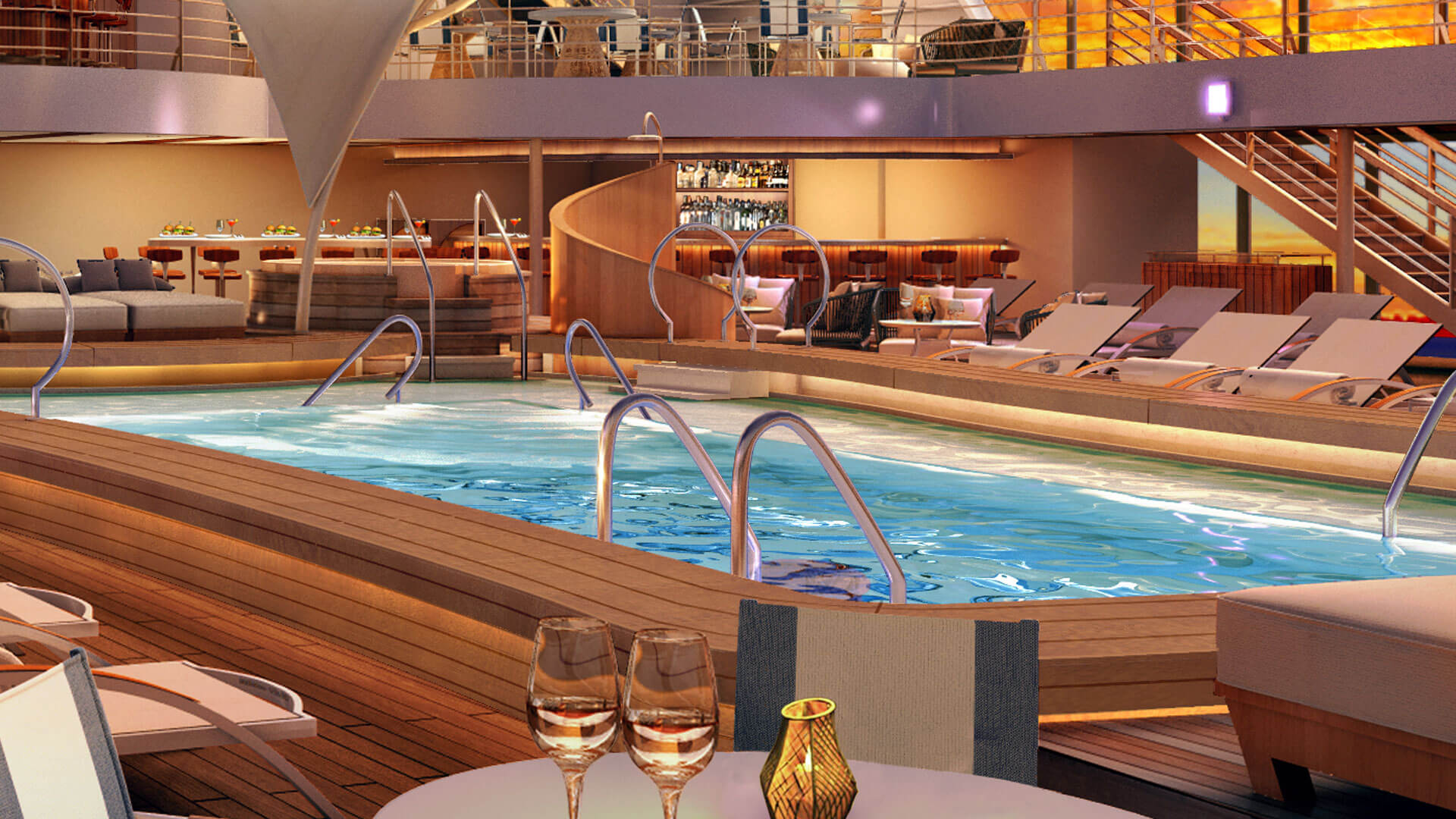
Offering the perfect setting for a sunny afternoon, the Pool Patio has everything you need for a day spent unwinding. The swimming pool is surrounded by a sundeck with chaise lounges, shaded seating, two large whirlpool spas, and is within steps of the Patio Grill and Patio Bar.
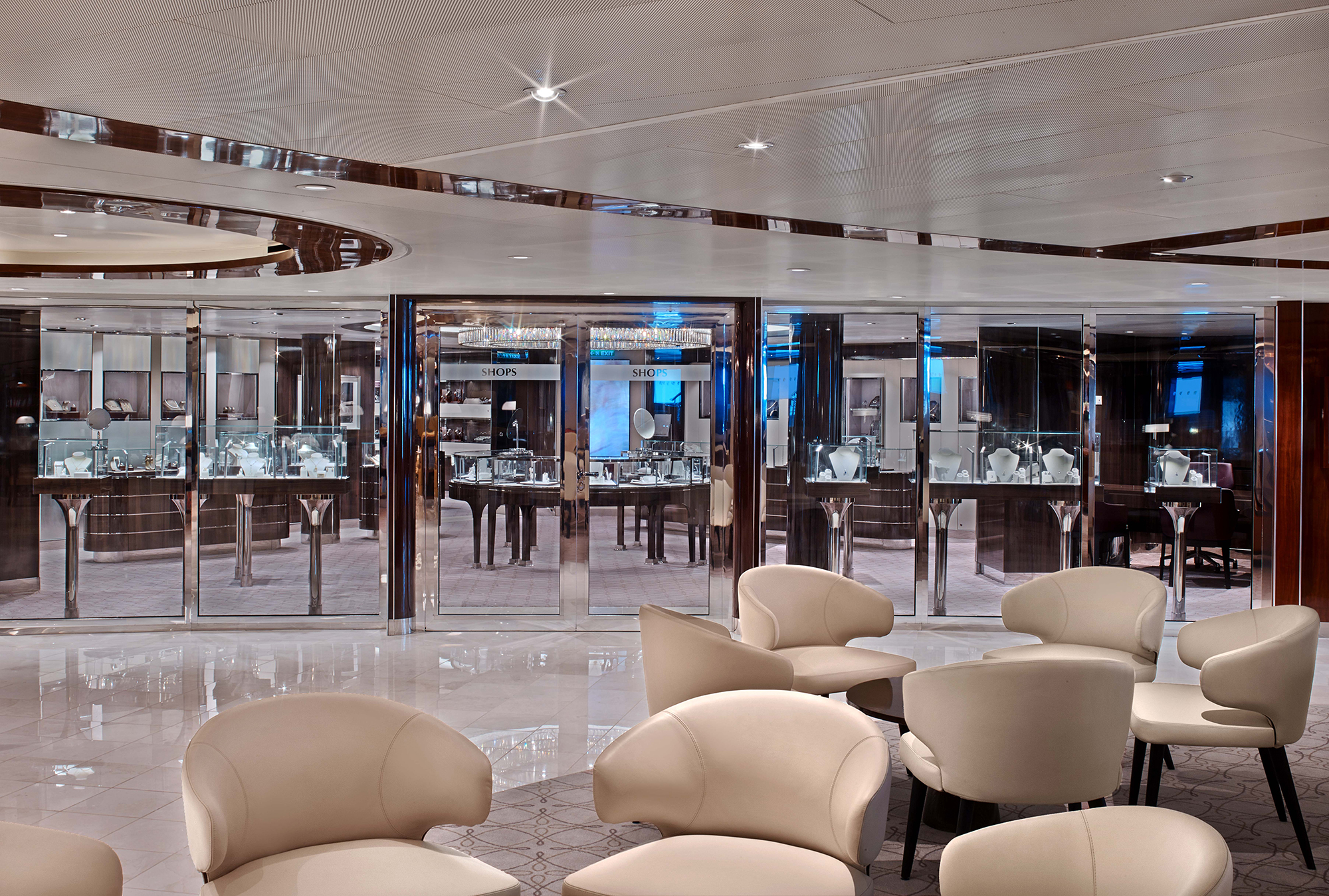
Whether you’re buying souvenirs for your friends at home or want a memento of your vacation, our Shops will have what you need. Shop for fashion and cosmetics at The Boutique, jewellery and fine watches at The Collection, or logo cruisewear at the Shop.

Afternoon tea is a tradition steeped in history and, one that has admirably stood the test of time. This inviting, social occasion, is perfect for catching up with friends on the day’s adventures or getting to know someone new. This new version, with white-glove service and live piano music features a range of quality teas and tisanes, all freshly brewed to your order, and a bountiful buffet of both sweet and savoury delicacies to tempt and satisfy every appetite.
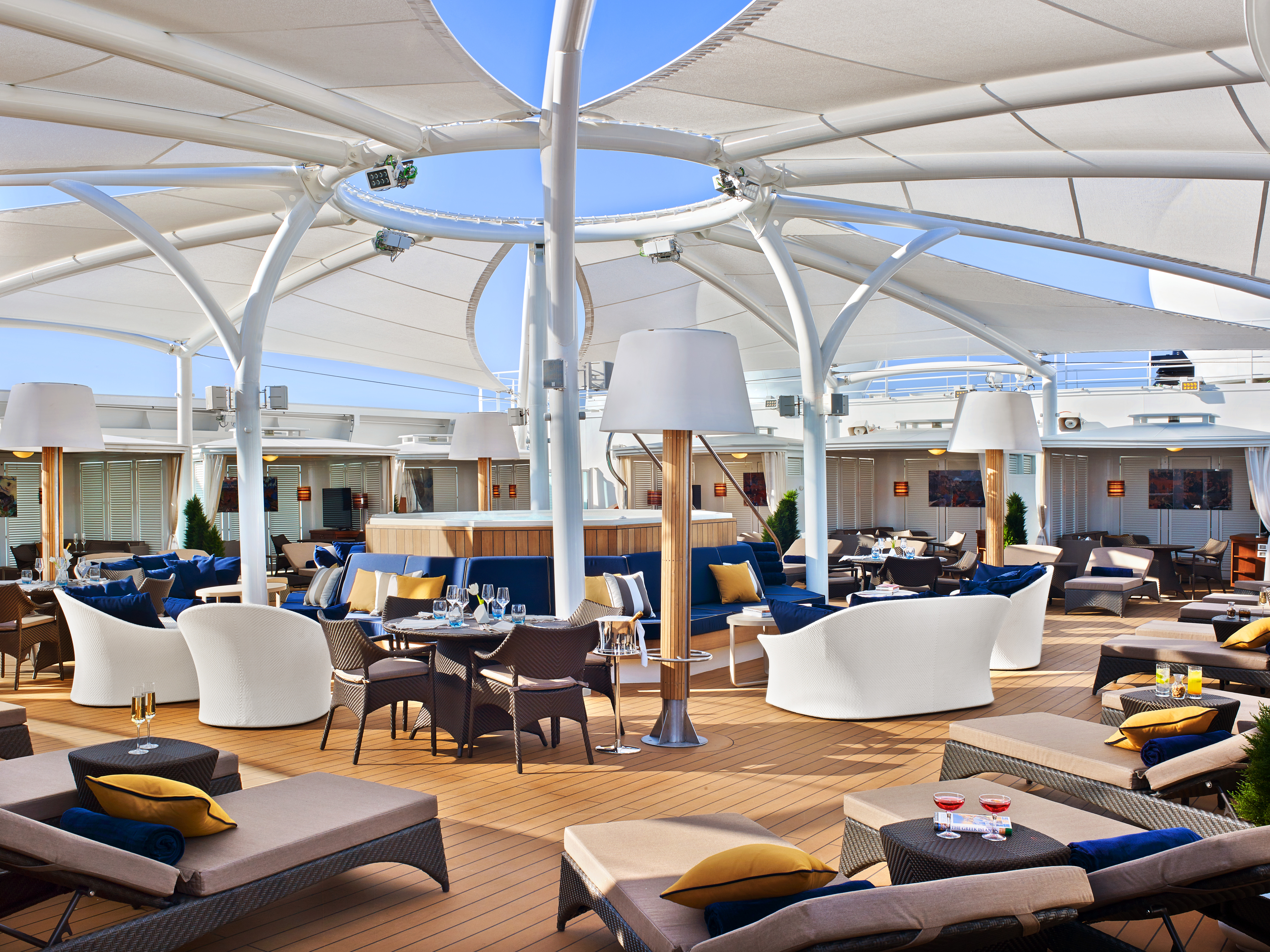
A tranquil setting housed in a distinctive flower-shaped canopy that shields guests from sun and wind, The Retreat is ringed with 15 private cabanas designed as individual luxury living rooms that each feature a large HD flat screen television and a refrigerator stocked with a personalised selection of beverages. An additional Spa Treatment Cabana is also available for guests to enjoy personalised spa services, subject to availability. For additional details or reservation, log in and customise your itinerary.
The Retreat is located around a central whirlpool with step-up access to water maintained at an inviting temperature. Up to 28 guests can stretch out on comfortable sun loungers; pull up a bar stool or take a table seat for champagne and cocktails custom created by Seabourn mixologists; or enjoy a selection of bites from a healthy spa menu. A selection of amenities include fresh fruit baskets, premium sun lotions, Evian mist spray, plush towels and personalised bathrobes, while a dedicated Retreat Concierge will be available to satisfy guest requests.
Cabanas at The Retreat will be available daily and may be reserved for a full day via the Guest Service Specialists at Seabourn Square.
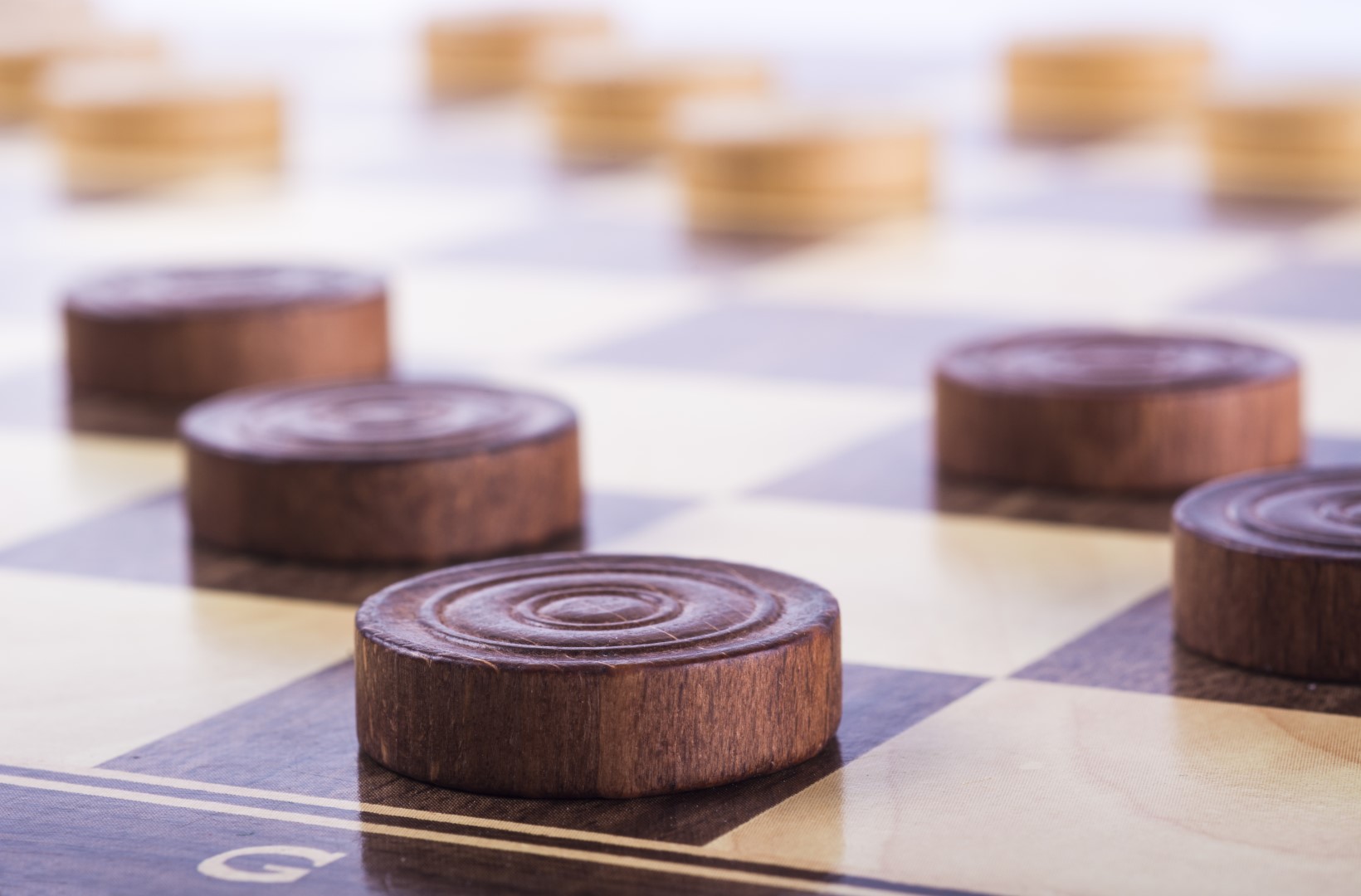
Many veteran cruisers specifically choose cruises that provide at least a few days at sea. The Card Room is a great choice for the sea-loving cruiser who craves that languorous feeling of lazy leisure. There will be loads of on board activities during those days, including a great game of bridge.
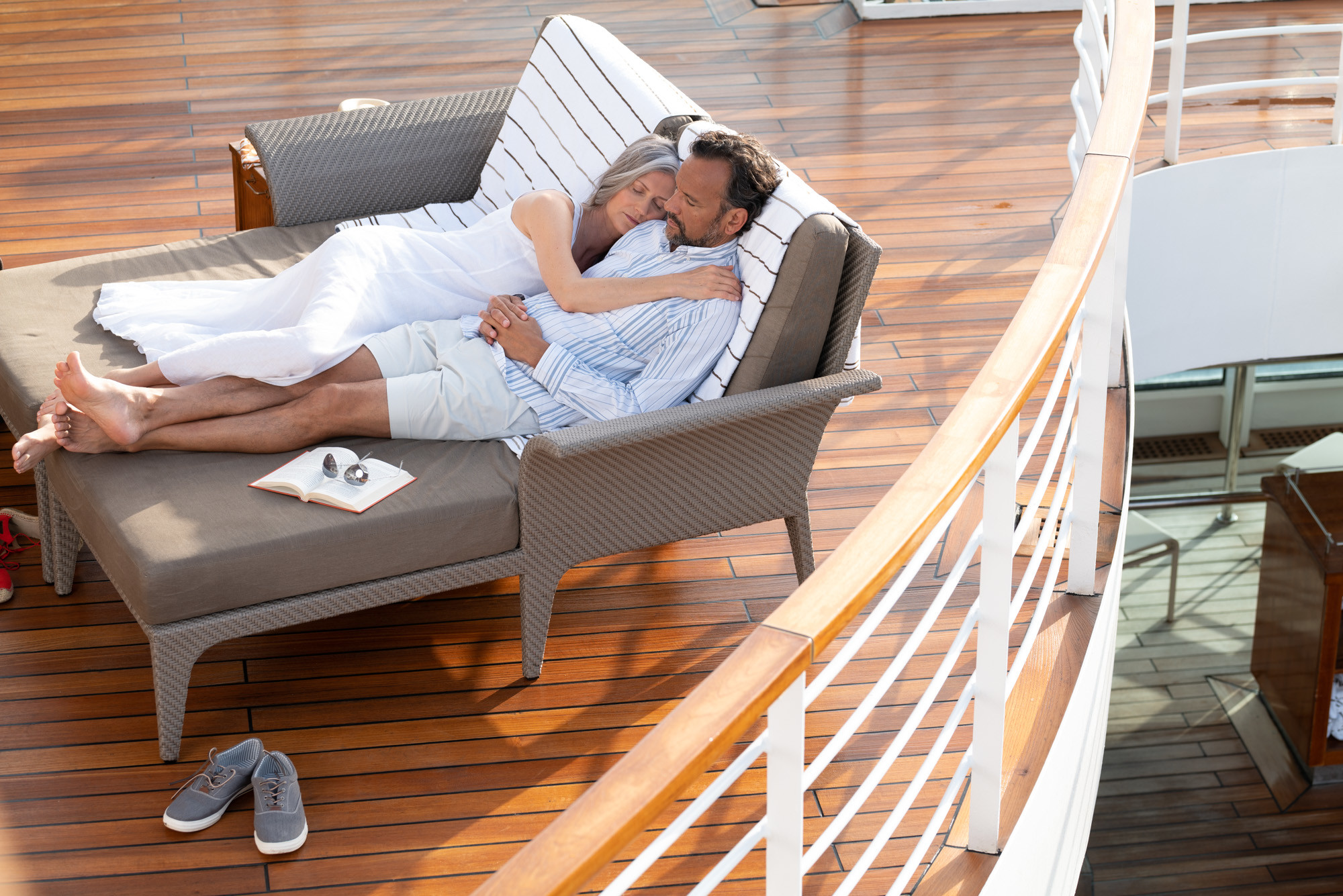
Sun Terrace with double sun loungers.
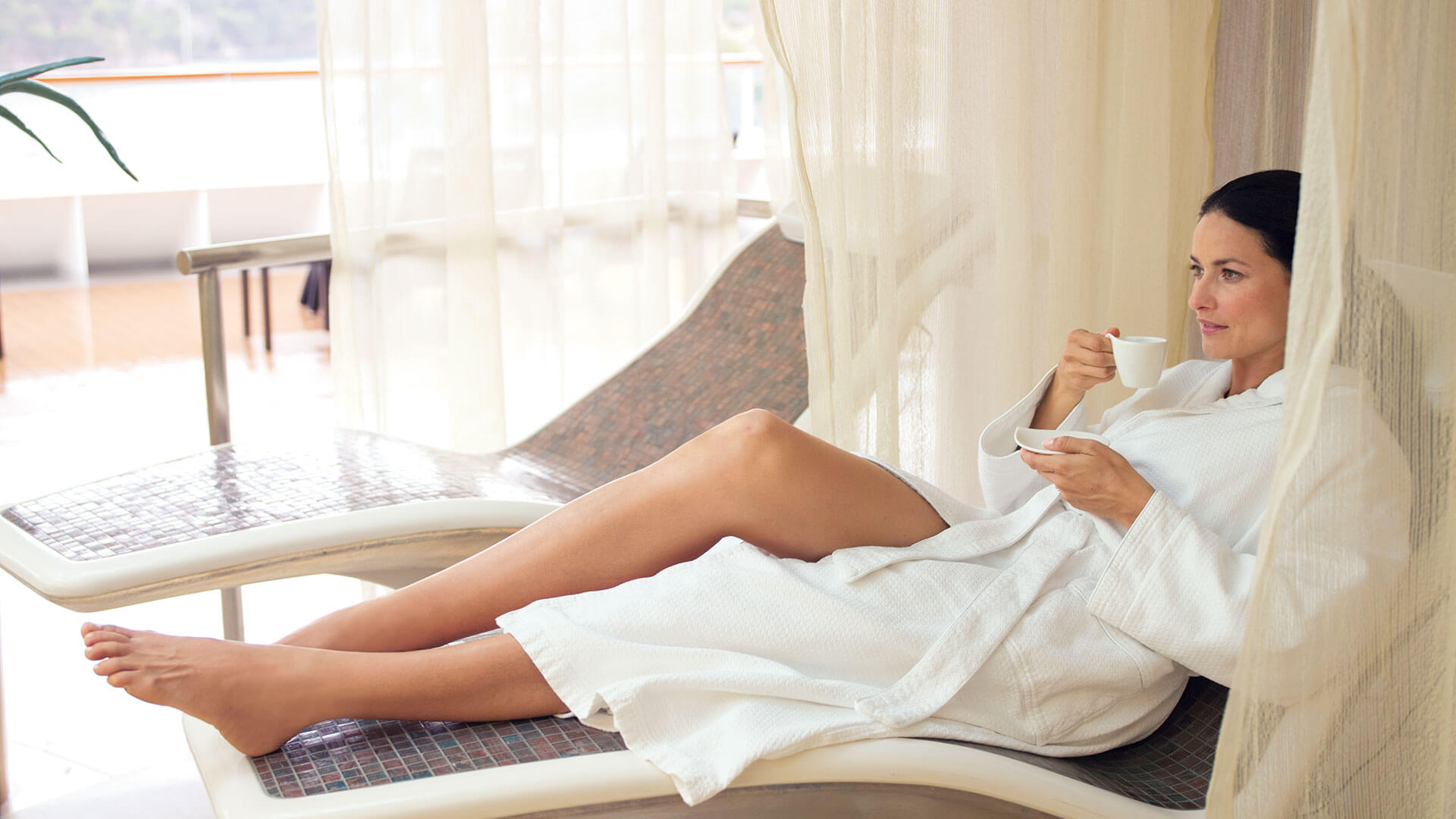
Seabourn’s Spa & Wellness with Dr. Andrew Weil is the first-ever program of its kind at sea. Seabourn has partnered with Dr. Weil, a visionary pioneer in integrative medicine, whose groundbreaking research and bestselling books combine physical, social, environmental and spiritual well-being. Each Seabourn ship’s Mindful Living Coach is a certified yoga and meditation practitioner who will inspire and educate guests with orientations, seminars and classes during the voyage. Guests who participate in the Mindful Living Program will have their cruise experiences further enhanced by a holistic mind and body perspective.
With Dr. Weil’s guidance, our fleet-wide mindful living curriculum delivers an even greater degree of mind and body balance, ensuring that guests can break away, relax and rejuvenate while they travel, and offering them an experience that will continue to enrich their lives long after their voyage.
Spa & Wellness With Dr. Andrew Weil
As part of the wellness enhancement in the spa, Seabourn are able to enjoy two new treatments fleetwide.
- Earth Grounding Massage: This enhanced treatment combines the therapeutic benefits of touch with a specialized grounding technology that harnesses the age old power of the Earth.
- Restorative Salt Stone Massage: Warm, Himalayan salt stones are bathed in personally selected aromatics to contour the body.
These treatments join two other options introduced on all Seabourn ships:
- Thai Massage: A fusion of traditional Thai Massage and the Chinese method of deep tissue pressure point massage and stretching techniques.
- Mindful Living Massage: Sweeping massage techniques, conscious breathing, and the vibrational effects of sound encourage energy flow to be restored.
These two treatments add to the number of reasons why cruise travel can have a positive impact on physical and mental well-being.
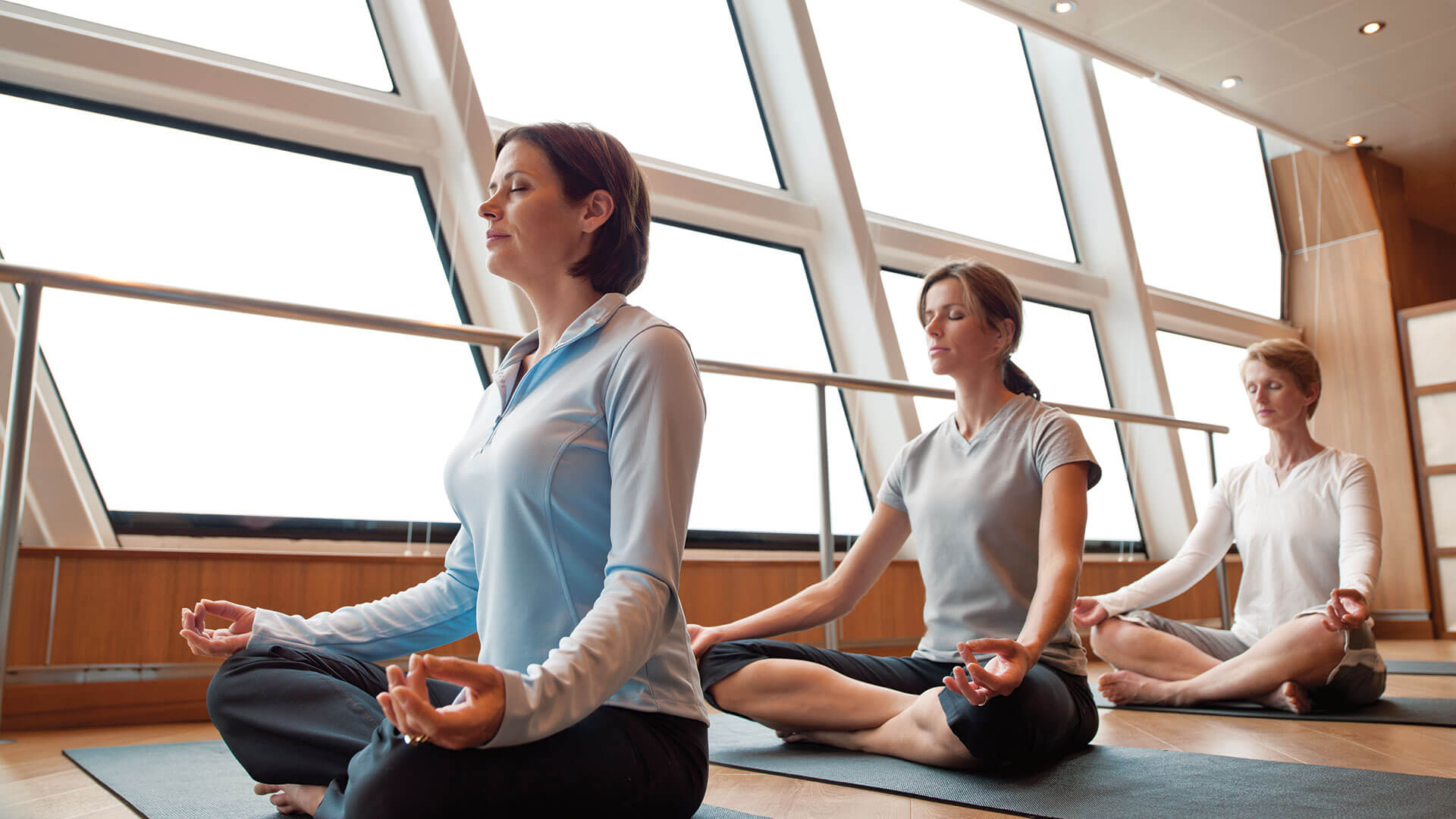
Our Fitness Center features high performance Technogym equipment for cardio and strength training. We also offer a series of complimentary classes including yoga, Pilates and Tai Chi. Or, if personal attention is preferred, our personal trainers will design a nutrition and exercise plan that will help you achieve results. Based on your body’s particular needs, this personalised session will expose you to the wellness program that works best with your body. Aboard Seabourn Odyssey, Seabourn Sojourn and Seabourn Quest you may try the Kinesis System. Using a tri-dimensional pulley system, our personal trainers will guide you through a series of exercises designed to improve balance, flexibility and strength.
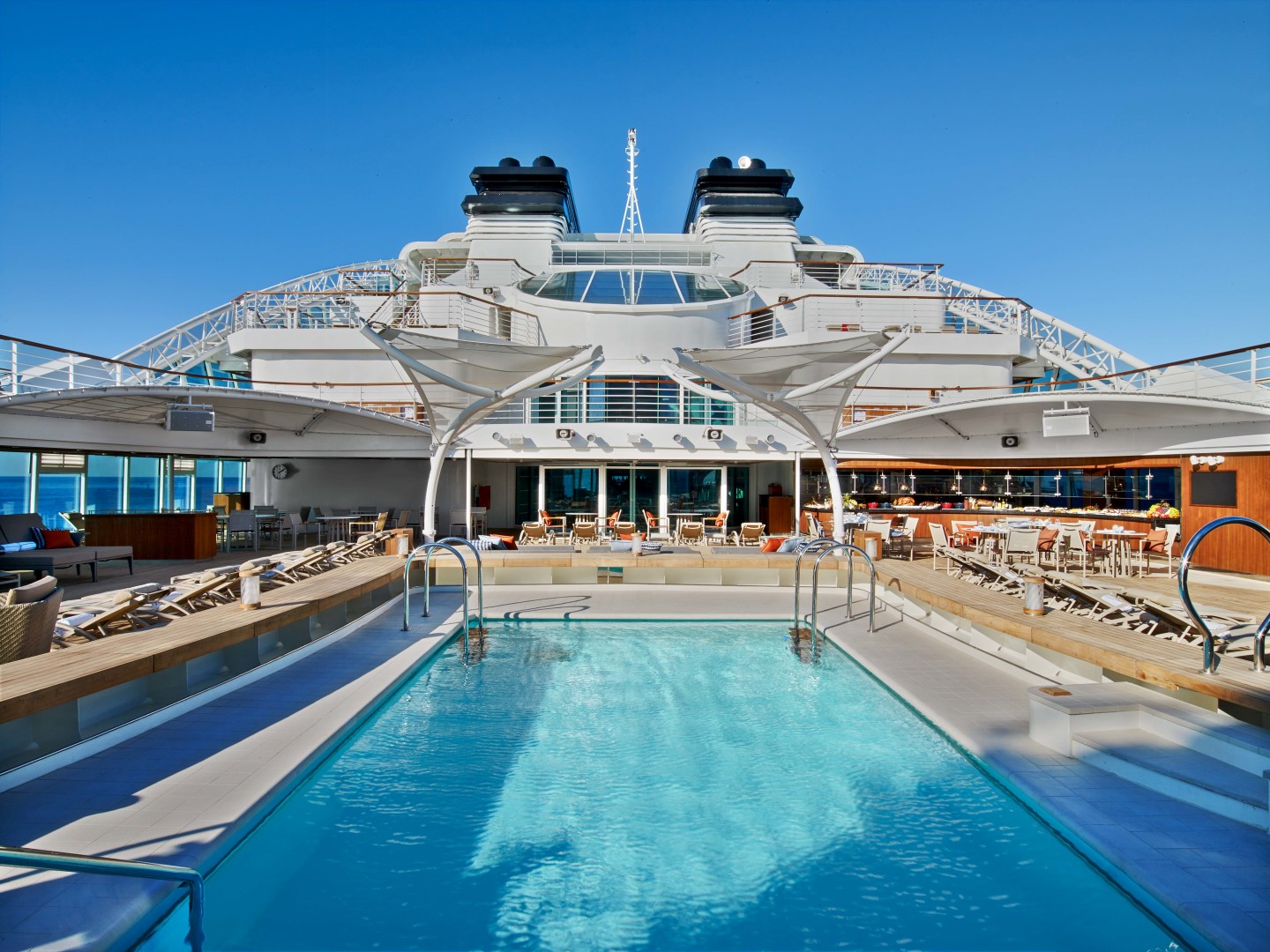
Offering the perfect setting for a sunny afternoon, the swimming pool is surrounded by an expansive sundeck with chaise lounges, shaded seating, two large whirlpool spas, and is within steps of the Patio Grill. Sun loungers and cabanas are arrayed in a mix of sun and shade. A stage provides occasional live music for dancing.
Seabourn is committed to providing safe, easy, and accessible accommodations for all persons with disabilities, to the extent that is feasible. It is for this reason that Seabourn is honoured to be a part of Carnival Corp., which received the Society For Accessible Travel & Hospitality’s (SATH) “Access to Freedom” award. This award is the highest honour in the travel industry that SATH presents to recognise individuals or organisations that have made the greatest strides in advancing opportunities for persons with disabilities, and for promoting the awareness of, and access for, travellers with disabilities.
The Importance of Planning Ahead
Seabourn does not discriminate against individuals on the basis of disability. We seek, to the extent feasible, to accommodate guests with disabilities. However, some needs require adequate time to prepare for a guest’s arrival. It is recommended that guests make every effort to contact Guest Accessibility and to submit a Special Requirements Information form (SRI) well in advance of the departure of their cruise and/or cruise tour. We recommend submitting an SRI upon booking or a minimum of 45 days prior to departure.
Guests who are unable to care for their basic needs (e.g. dressing, eating, and attending safety drills) MUST have a capable traveling companion. The medical staff on board is not available for daily care unless an individual is hospitalised in the ship’s Medical Centre. In limited situations (either on board or ashore), we may find it necessary to ask the individual to make alternative travel arrangements, such as if an individual with a disability is unable to satisfy certain specified safety and other criteria, even when provided with appropriate auxiliary aids and services.
Our vessels have specially designed suites for guests who need mobility assistance. If you have not booked one of these accessible suites but instead will be using a standard suite you need to know about some limitations that adversely impact manoeuvrability, especially ingress and egress. Most entry doors and bathroom doors in non-accessible suites measure 23 inches wide. Bathrooms have a doorsill and the bathtubs are often difficult to negotiate for guests who have limited mobility. Passageways within the suite may be too narrow for a wheelchair or scooter to manoeuvre throughout the suite.
Accessible Suites offer features such as wider entry doors to the suite and bathroom measuring a minimum of 32 inches wide, accessible showers with grab bars, benches/seats, and hand-held shower heads as well as lowered closed and towel rods.
Accessible suite numbers are detailed in the section below by ship and their locations are noted on the deck plans for each ship within the “Onboard Life” section of this website.
Note: For safety reasons, mobility devices must be stored and charged in the guest’s suite.
If you are on an Expedition voyage click here for information. If you are on another Seabourn voyage please find the below information applicable to your cruise.
Seabourn Venture and Seabourn Pursuit
- Suites 825, 824, 800, 738 and 737 have transfer shower configurations.
Seabourn Encore and Seabourn Ovation
- Suites 1132, 1012, 664, 665, and 550 have transfer shower configurations.
- Suite 1191 has a roll-in shower configuration.
Seabourn Odyssey, Seabourn Sojourn and Seabourn Quest
- Suite 635 has a transfer shower configuration.
- Suites 913, 813, 815, 619, 619 and 408 have roll-in shower configurations.
Seabourn only permits service animals on board, defined as those animals that are individually trained to provide assistance to an individual with a disability. We do not permit our guests to bring pets, therapy/companion animals, and other animals that do not meet the definition of service animals. If you have any questions about whether the animal you wish to bring on board is, in fact, a service animal, you may contact Guest Accessibility.
Your itinerary may include ports of call that have very specific and strict requirements that need to be met prior to your service animal being allowed off of the ship. Please be sure you understand the requirements for a service animal to disembark in each port of call. The best places to obtain specific information on required documentation and immunisations for your service animal are the U.S. Department of Agriculture’s website, local customs offices in the specific ports, and from your service animal’s veterinarian. All documentation and immunisation requirements are established by government authorities and not by Seabourn. Should you need assistance in locating this information, please contact Guest Accessibility.
To board the ship, your service animal must have current vaccinations. Records confirming the vaccination status should be provided to Guest Accessibility prior to your departure. We also recommend that you carry the immunisation records with you in case they are required at any port of call. If you do not have the proper documentation and proof of vaccinations for your service animal required at a port of call, or if there are local quarantine requirements, your service animal will be denied the right to leave the ship. If your service animal is denied the right to leave the ship in a specific port of call, the staff and crew will work with you to determine what actions may be possible to allow you to visit the port without your service animal. Please note that in your absence, you will need to provide for the care and supervision of your service animal. Except in those circumstances where your service animal has been denied disembarkation, you may not leave your service animal unattended on the vessel or in your suite at any time.
The Australian quarantine authorities have changed their approach regarding service dogs on-board cruise ships. Unfortunately, their new approach makes it practically impossible for us to accept service animals on domestic or roundtrip cruises from Australia. The Department of Agriculture now considers these cruises to be akin to an international voyage and therefore under ‘biosecurity control’. As a company, we are incredibly disappointed with the Department’s new approach, and we have written to the Federal Minister to ask for a return to their previous way of doing things. At this time guests will not be able to travel with service animals on voyages that end in Australia or call upon a port in Australia after visiting a foreign country. Guests sailing on voyages that begin in Australia will be able to sail with their service animal provided the voyage does not return to Australia after visiting a foreign port. Should you have further questions please contact Guest Accessibility via email at Access@Seabourn.com.
For guests with food intolerances or allergies that are not life-threatening, please contact our Reservations Department. For guests with life-threatening food allergies, we ask that guests provide detailed information to Guest Accessibility by completing a Special Requirements Information form (SRI). Guests should indicate on this form which foods may potentially cause a severe reaction.
Guests with a variety of severe food allergies sail with Seabourn regularly. Our galley staff on board is accustomed to and experienced in dealing with these types of needs. The galley itself has many different areas of food preparation, which can help reduce the possibility of cross-contamination. It is important to note, however, that meals are prepared in open galleys on board the ships, thus there is always the possibility of some cross-contamination. As such, Seabourn cannot guarantee that a guest will not come in contact with those items. Although Guest Accessibility will provide the ship with an advance notice of all food allergies detailed on an SRI submitted to them, it is recommended that guests also contact the Maitre d’ upon boarding to review the details of these special dietary needs.
Guests under 21 years of age must be accompanied by a parent, guardian or chaperone who is at least 21 years old; one adult chaperone is required for every five people under age 21. A guest must be at least 6 years of age at the time of embarkation in order to sail on voyages to Antarctica or on Expedition Cruises. We will not accept reservations for infants 6 months or younger for non-transocean sailings, 12 months or younger for transocean sailings at the time the cruise commences. Seabourn cannot accept a booking or carry any guest who will be 24 completed weeks or more pregnant on the last day of the intended cruise. All pregnant women are required to produce a physician’s letter stating that mother and baby are in good health, fit to travel, and that the pregnancy is not high-risk.
Attire During the Day:
- During the daytime, casual, resort-style attire, including shorts and jeans, is welcome in all lounges and dining venues. Swimsuits, brief shorts, cover-ups and exercise attire should be reserved for poolside, on deck or in the spa and fitness centre.
In the evening (after 6pm) there are two different dress codes:
Elegant Casual
- Men: Slacks with a collared dress shirt or sweater; Jacket Optional.
- Ladies: Slacks / skirt, blouse, pant suit or dress. This is the dress standard for all dining venues
- Jeans are welcome in all dining venues during the day, but not appropriate in The Restaurant after 6pm.
Formal
- In the Restaurant, Men: Tuxedo, suit or slacks and jacket required.
- Ladies: evening gown or other formal apparel. Dress in other dining venues is Elegant Casual.
- Jeans are welcome in all dining venues during the day, but not appropriate in the Restaurant after 6pm.
The itinerary in the preliminary document booklet will inform you of the number of Formal evenings to expect during your voyage. As a rule of thumb, Formal evenings are scheduled as follows:
- Cruises up to 13 days: One Formal evening
- Cruises of 14 to 20 days: Two Formal evenings
- Cruises of 21 or more days: Three Formal evenings
(Note: Extended Explorations, Holiday voyages and crossings may be scheduled differently.)
Attire Ashore:
Packing clothing that can be layered is the best way to plan for cruising in virtually any climate. For tropical cruises, bring light, loose-fitting garments that can be paired with a lightweight jacket or sweater. For cooler climates, pack extra layers of warmer garments such as a light top coat and some sweaters. When dressing to go ashore, it is helpful to be aware of the customs of the countries you are visiting. In some ports men and women should not wear shorts. Many cultures prefer that women wear dresses or skirts when visiting shrines, churches, mosques and temples.
Some of our more adventurous destinations like Alaska and Antarctica voyages have additional special packing requirements.
- Packing for an Alaska Cruise
- Packing for an Antarctica Cruise
Please Note: Firearms, explosives, fireworks, other weapons and knives or sharp blades over 2.5 inches long and illegal drugs of any kind are prohibited without exception.
Full list of Prohibited Items
For safety reasons drones and any other remote controlled aerial devices/toys, as well as hoverboards or similar devices are not allowed on board our ships.
ON SEABOURN VENTURE AND SEABOURN PURSUIT:
We are implementing a “no smoking” policy on Seabourn Venture and Seabourn Pursuit, our two expedition ships, which includes e-cigarettes. Expedition travel visits many remote and rarely visited environments that are pristine, with diverse ecosystems and wildlife. We have implemented this policy to eliminate the possibility that cigarette butts and other smoking materials would end up harming the environment.
ON ALL OTHER SEABOURN SHIPS:
For the comfort of all guests, most public areas on board, as well as guest suites are smoke-free.
Cigarette smoking is permitted in the following areas:
Smoking of electronic cigarettes is permitted in guest suites. Smoking of water-pipes, glass-pipes or other smoking devices is not permitted on board. Smoking is not permitted on open decks during fuel bunkering operations in port.
Inside smoking of cigarettes is not permitted.
Outside smoking of cigarettes is permitted in designated areas of Seabourn Odyssey, Seabourn Sojourn, Seabourn Quest, Seabourn Encore and Seabourn Ovation:
- The designated smoking area for all ships is the starboard half of the Sky Bar open deck.
- Cigarette, cigar & pipe smoking is allowed on the starboard half of the Seabourn Square outside deck.
Guests are asked to refrain from smoking anywhere inside the ship, including in guest suites, on verandas and balconies. If you have any doubts about any area, please consult your onboard staff.
Any guest who smokes inside staterooms or on adjoining verandas in violation of our policy will be charged a US$250 cleaning fee per day of violation
Seabourn ships offer guests access to the internet by means of transmission between satellites orbiting approximately 20,000 miles above the earth and our mobile shipboard system. While this technology enables mid-ocean access in virtually every part of the world, satellite service is frequently noticeably slower and slightly less reliable than land-based methods of access due to the motion of the ship and limitations of bandwidth. There are two main reasons for this:
- The available bandwidth from satellite transmission is much lower than is available from most shoreside systems served by stationary cables with much greater bandwidth capacity.
- In addition, a shipboard system is typically serving a greater number of users simultaneously than most shoreside networks. Many shoreside users use wireless cell phone systems for internet access, further reducing demand on hardwired systems. Each user’s data transmission occupies a portion of the available bandwidth. More users means slower service.
For these reasons, we ask that guests not use internet service for high volume uses such as gaming, file sharing or streaming video content. The internet service on board is generally quite adequate for all guests’ usage when web browsing and sending or retrieving email.
Guests can access the internet either at terminals located in Seabourn Square, or wirelessly using their own wireless-enabled devices in most locations on board, including in guest suites, lounges and most areas on open decks.
Full laundry, dry cleaning (on selected ships wet-cleaning) and pressing services are available. Suite attendants take care of pick-up and delivery. Same-day service is available at extra charge if requested by 9:00 a.m. A complimentary launderette with washers, dryers, laundry soap and ironing facilities are available onboard all Seabourn ships..
Your ship’s small but modern basic medical facility is staffed by a doctor and a nurse. This facility is equipped to provide medical care for illness or accidents that may arise during the cruise, but is not intended to provide ongoing medical treatment. Since we are either at sea or in ports where availability of medical facilities and pharmaceutical products may be limited, we suggest you bring adequate supplies of prescription medications and other health-related items.
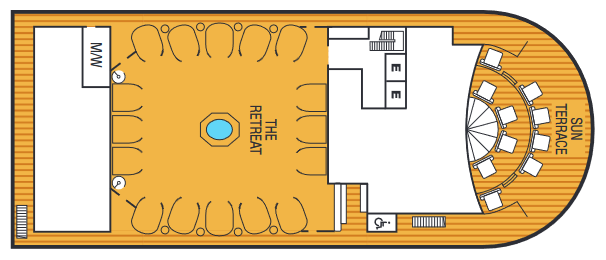
- Sun Terrace
- The Retreat

- Observation Lounge
- Veranda Suite
- Penthouse Spa Suite
- Penthouse Suite

- Bridge
- Sky Bar
- Salon
- Treatment Rooms
- Thermal Area
- Spa & Wellness Area
- Motion Studio
- Fitness Centre
- Veranda Suite
- Owner’s Suite
- Penthouse Suite

- Whirlpools
- Pool
- The Patio
- Patio Bar
- The Colonnade
- Veranda Suite
- Owner Suite

- Sushi
- The Grill by Thomas Keller
- Card Room
- Wintergarden Suite
- Signature Suite
- Owner’s Suites
- Veranda Suite
- Grand Wintergarden Suite

- Whirlpool
- Meeting Rooms
- Shops
- Coffee Bar
- Seabourn Square
- Owner’s Suites
- Veranda Suites

- Grand Salon
- Veranda Suites

- Casino
- The Club
- Club Bar
- Pool
- Whirlpools
- Veranda Suites

- Medical Facility
- The Restaurant
- Galley
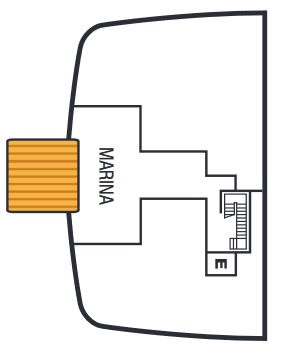
- Marina

